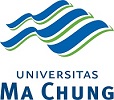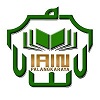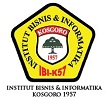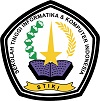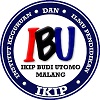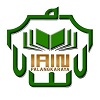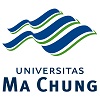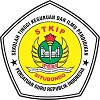International Asia Pacific Religious Tourism and Pilgrimage Conference (APIRTP 2024)
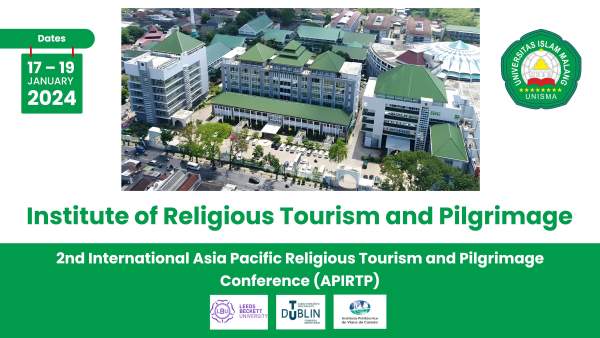
-
The 2nd International Asia Pacific Religious Tourism and Pilgrimage Conference
January 17, 2024 – January 19, 2024
EBESSIC : Economics, Business, Entrepreneurship & Social Sciences International Conference
EBESSIC : Economics, Business, Entrepreneurship & Social Sciences International Conference

-
ECONOMICS, BUSINESS, ENTREPRENEURSHIP & SOCIAL SCIENCES INTERNATIONAL CONFERENCE 2023
December 13, 2023 – December 14, 2023 -
Economics, Business, Entrepreneurship & Social Sciences International Conference 2022
December 7, 2022 – December 8, 2022Global Recession and Economic Recovery in Achieving SDGs
The Economics, Business, Entrepreneurship Social Sciences International Conference ( EBESSIC) 2022 will be held in Hybrid offline and online (zoom) on December 7, 2022 (Tuesday).
The conference is organized by the Faculty of Economics and Business Universitas Islam Malang. The co-organizers are the University Moscow City University, Universiti Tun Hussein Onn Malaysia, Graduate School of Entrepreneurship and Business Universiti Malaysia Kelantan, Prince of Songkla University Thailand, Tarlac Agriculture University Philipines, Universitas Muslim Indonesia, STIE YKPN Yogyakarta, Universitas Negeri Jakarta.
The English Language is the official language of the conference. Prospective authors are cordially invited to submit abstracts and full papers for oral presentation. All accepted abstracts/papers will be published in the conference proceeding with ISBN.
Please submit your abstract/paper to submissionebessic@unisma.ac.id
KEYNOTE SPEAKER:
- Prof. Elchin A. Gashimov ( University Moscow City University)
- Dr. Sutan Emir Hidayat ( Direktur Infrastruktur Ekonomi Syariah)
- Dr. Shadi Emad A Alhaleh, Ph.D. ( Zhengzhou University of Industrial Technology)
- Associated. Prof Azlina md Yasin ( UTHM, Malaysia)
- Dr. Wathanan Srinin ( Prince Songkla University, Thailand)
- Jeroen Rijenberg ( CEO NASU SBDI center Netherland )
- Fred Kuo ( Emliku Smart Technology, Taiwan)
- Ass. Prof. Dzulkifli bin Mukhtar (UMK Malaysia)
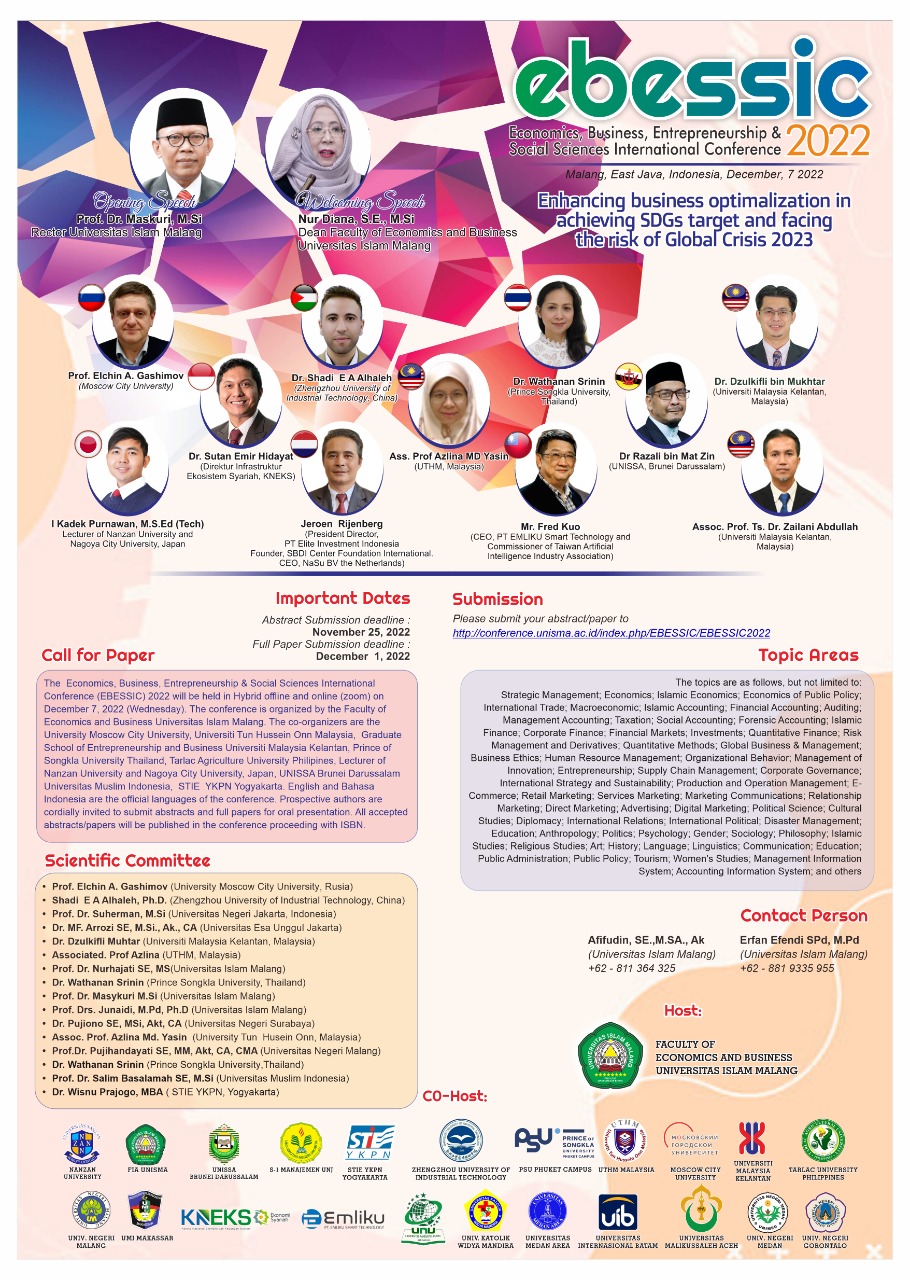
ICEBUSS : International Conference on Economics, Business and Social Science
ICEBUSS : International Conference on
Economics, Business and Social Science
International Conference on Science, Technology, and Engineering for Sustainable Development (ICoSTES)
Background of the Conference
Sustainable development is a development process for meeting human development goals while maintaining the ability of natural systems to provide the natural resources and ecosystem services on which the economic system of society depends. The achieved result in sustainable development is a condition of community life and the use of resources continuously meets human needs without undermining the integrity and stability of the natural system. Sustainable development must meet the needs of the present without sacrificing the needs of future generations. The achievement of sustainable development is highly dependent on the stability of ecosystems in a region. Meanwhile, the stability of the ecosystem is largely determined by biodiversity above and below ground.
The ASEAN as a region is basically rich and diverse in agriculture, natural resources, and the physical environment. There is genetic diversity, species diversity, and ecosystem diversity ideal for the basic and applied sciences related to agriculture and the rich biodiversity in our environment. Technology and engineering help enhance science that benefits society and humanity. There is a need to nurture these diverse landscapes and resources to sustain the megadiversity status of Indonesia and other countries in the world. Incidentally, nurturing these rich resources needs an urgent interdisciplinary and transdisciplinary collaboration among ASEAN and international professionals in the fields of agriculture and natural sciences. Additionally, the fields of technology and engineering can indeed help make all our aspirations a reality. It is in this light that Universitas Islam Malang (UNISMA) has successfully conducted the First International Conference on Science, Technology, and Engineering for Sustainable Development in 2018 (1st ICoSTES 2018). The conference involved hundreds of participants from graduate schools, research agencies, and universities. Involved in the first ICoSTES 2018 were notable speakers and participants from around the world. To expand our aims, The Second International Conference on Science, Technology, and Engineering for Sustainable Development (2nd ICoSTES 2023) will be conducted on December 6, 2023. The conference aims at fostering sustainable development in natural sciences, technological advances, and engineering for societies through empirical research.
Scope:Earth Science, Energy and Mining, Environmental Science, and Sustainable Development.
-
The 2nd ICoSTES 2023
December 6, 2023 – December 7, 2023Background of the Conference
Sustainable development is a development process for meeting human development goals while maintaining the ability of natural systems to provide the natural resources and ecosystem services on which the economic system of society depends. The achieved result in sustainable development is a condition of community life and the use of resources continuously meets human needs without undermining the integrity and stability of the natural system. Sustainable development must meet the needs of the present without sacrificing the needs of future generations. The achievement of sustainable development is highly dependent on the stability of ecosystems in a region. Meanwhile, the stability of the ecosystem is largely determined by biodiversity above and below ground.
The ASEAN as a region is basically rich and diverse in agriculture, natural resources, and the physical environment. There is genetic diversity, species diversity, and ecosystem diversity ideal for the basic and applied sciences related to agriculture and the rich biodiversity in our environment. Technology and engineering help enhance science that benefits society and humanity. There is a need to nurture these diverse landscapes and resources to sustain the megadiversity status of Indonesia and other countries in the world. Incidentally, nurturing these rich resources needs an urgent interdisciplinary and transdisciplinary collaboration among ASEAN and international professionals in the fields of agriculture and natural sciences. Additionally, the fields of technology and engineering can indeed help make all our aspirations a reality. It is in this light that Universitas Islam Malang (UNISMA) has successfully conducted the First International Conference on Science, Technology, and Engineering for Sustainable Development in 2018 (1st ICoSTES 2018). The conference involved hundreds of participants from graduate schools, research agencies, and universities. Involved in the first ICoSTES 2018 were notable speakers and participants from around the world. To expand our aims, The Second International Conference on Science, Technology, and Engineering for Sustainable Development (2nd ICoSTES 2023) will be conducted on December 6, 2023. The conference aims at fostering sustainable development in natural sciences, technological advances, and engineering for societies through empirical research.
Scope:Earth Science, Energy and Mining, Environmental Science, and Sustainable Development.
-
The 1st ICoSTES 2018
September 10, 2018 – September 11, 2018Sustainable development is a development process for meeting human development goals while maintaining the ability of natural systems to provide the natural resources and ecosystem services in which the economic system of society depends. The achieved results in sustainable development is a condition of community life and the use of resources continuously meet human needs without undermining the integrity and stability of the natural system. Sustainable development must meet the needs of the present without sacrificing the needs of future generations. The achievement of sustainable development is highly dependent on the stability of ecosystems in a region. Meanwhile, the stability of the ecosystem is largely determined by biodiversity above and below ground.
The ASEAN as a region is basically rich and diverse in agriculture, natural resources and the physical environment. There is genetic diversity, species diversity and ecosystem diversity ideal for the basic and applied sciences related to agriculture and the rich biodiversity in our environment. Technology and engineering help enhance the science that benefits society and humanity. There is a need to nurture these diverse landscapes and resources to sustain our megadiversity status of Indonesia and other countries in the world. Incidentally, nurturing these rich resources needs an urgent interdisciplinary and transdisciplinary collaboration among ASEAN professionals in the fields of agriculture and natural sciences, social sciences, humanities and the arts. Additionally the fields of technology and engineering can indeed help make all our aspirations a reality. It is in this light that we have to initiate this 1st International Conference on Science, Technology and Engineering for Sustainable Development (ICoSTES 2018) in the University of Islam Malang (UNISMA).
Keynote and Plenary Speakers:
- Prof. Inocencio E.Buot Jr, Ph.D.(University of Philippine Los Banos).
- Assoc. Prof. Dr. Pramote Paengkum (Suranaree University of Technology, Thailand)
- Prof. Thanda Aye, Ph.D (Yangon University, Myanmar)
- Prof. Wu, Jiunn-Chi (National Central University, Taiwan)
- Assoc. Prof. Rawshan Ara Begum (Kumamoto University, Japan)
- Prof. Sutiman Bambang Sumitro, SU., DSc, (Brawijaya University)
Subthemes, papers may be accepted under the following themes:
- Basic Sciences (Biology, Ecology, Chemistry, Genetics, Molecular Biology)
- Applied Sciences (Agriculture, Animal Husbandry, Forestry, Fishery)
- Technology (Biotechnology, Tissue Culture)
- Engineering (Electrical, Mechanical, Civil and Agricultural Engineering)
- Social Sciences/Policy Papers/Education
General Information:
The Organizing Committee invites you to participate in the ICoSTES 2018 conference. All agriculture, animal husbandry, natural science, and engineering related academics, researchers, professionals, students and interested colleagues are welcome to attend the conference. Registration is only for the conference participation and does not include acceptance of oral or poster presentations. Participants who would like to present at the conference will be notified of acceptance status from the scientific committee by email on 11 July 2018 at the latest. If you have questions about your registration, please contact ICoSTES 2018 Secretariat at email address: icostes2018@unisma.ac.id or ismichoirotin@yahoo.com
Confirmation of Registration:
Registration confirmation email will be sent to you within 24-48 hours. If you do not receive any email message, please contact the registration office by email at icostes2018@unisma.ac.id or ismichoirotin@yahoo.com or phone at +6285648111153
Payment:
Registration fee shall be paid by a bank transfer till 1 September 2018 or your booking will be forfeited.
Please remit to:BANK
BNI
BRANCH
UNIBRAW BR. MLG
SWIFT CODE
BNINIDJAUBM
ACCOUNT NAME
IBU SRI HINDARTI
ACCOUNT No.
0691806829
Payment confirmation please send to email: hindartyrudy@gmail.com or icostes2018@unisma.ac.id
Important:
Please do not forget to indicate your NAME+SURNAME and ICoSTES 2018 on your remittance. All prices are quoted in US dollars and include VAT. Payment must be remitted in US dollar, all bank charges are to be paid by the sender. For domestic remittance (Indonesian participants), please make payment in Rupiahs.
Publication Opportunities:
The authors of abstracts accepted for oral or poster presentations will be invited to submit their full papers for consideration in (only selected paper):
- Journal of Nature Studies, the official primary and scientific publication of the Philippine Society for the Study of Nature, Inc. (PSSN)
- Journal of Biological Researches (Accredited by Ministry of Research and Higher Education Number 32a/L/KPT/2017)
- Buletin of Animal Sciences, University of Gadjah Mada Indonesia
International Conference on Multidisciplinary Sciences for Humanity in The Era of Society 5.0
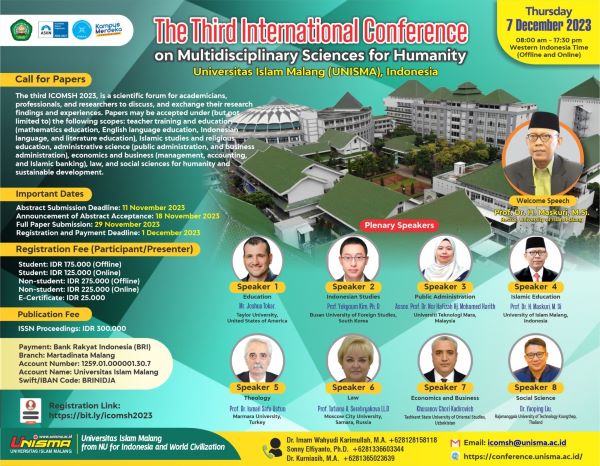
-
The 3rd ICOMSH Volume 3, 2023
December 7, 2023 – December 8, 2023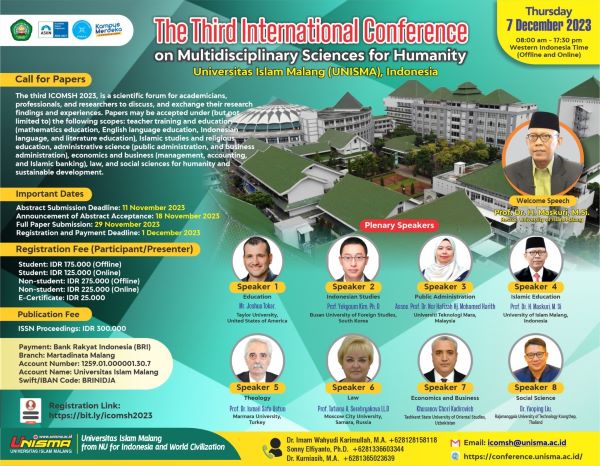
- Background
Industrial Revolution 4.0 was started with the concept of the digital industrial era/information and communication technology era in Germany with 6 main pillars namely digital society, sustainable energy, smart mobility, healthy living, civil safety, and technology in the workplace. Indonesia has implemented Industry 4.0.
The era of super smart society (society 5.0) was introduced by the Government of Japan in 2019, which was made in anticipation of the turmoil of disruption due to the Industrial Revolution 4.0, which led to a complex and ambiguous liberation. Where at that time Japan was experiencing a population reduction challenge that reduced the productive age population/workers, so Japan tried to improve this condition by implementing Society 5.0. It is feared that the invasion will erode the values of human character that have been maintained so far.
Society 5.0 is a society that can solve various challenges and social problems by utilizing various innovations that were born in the era of the Industrial Revolution 4.0 such as the Internet of Things. Artificial Intelligence, Big Data, and robots to improve the quality of human life. Society 5.0 can also be interpreted as a concept of society that is based on humans and technology.
In facing the era of society 5.0, the world of education plays an important role in improving the quality of human resources. In addition to education, several elements and stakeholders such as the government, Community Organizations, and the whole community also take part in welcoming the era of society 5.0.
There are five elements in Society 5.0, namely: emotional elements, intellectual elements, physical elements, social elements, and spiritual elements. These five elements are related to each other in a balance. With the Society 5.0 concept, it is hoped that it can minimize the negative impact of robotic technology and artificial intelligence so that it does not dominate human life without adequate control, but humans are actors who control and control robotic technology and artificial intelligence. Thus, Society 5.0 is a foresight in organizing an ideal social life, as a response to the industrial revolution 4.0 which is feared will degrade the role of humans due to dependence on advances in robotic technology and artificial intelligence. With Society 5.0, it is hoped that there will be a balance of life between the use of technology and a more humane quality of human life.
This conference aims to achieve the following objectives:
- Producing theories of Islamic studies, education, economics, and law from an Islamic perspective through investigations of contemporary issues in a disruptive era.
- Innovation of new models and methods of integrative Islamic studies, education, economics, and law which are in harmony with humanity and religiosity.
- Promote the importance and relevance of Islamic-inspired human sciences for the sake of human civilization.
- Building scientific networks between Muslim scholars and universities throughout Indonesia and the world in collaboration to disseminate and develop a sustainable agenda of "Islamic studies, education, economics, and law".
- Develop a research center for Islamic studies, education, economics, and law, inspired by Islamic teachings and intellectual traditions.
- Encouraging Muslim scholars to answer existing problems related to the humanitarian crisis in the current context through scientific forum meetings.
- Theme
Interconnecting Educational, Religious, and Social Sciences for Sustainable Development of Humanity
- Subthemes
- Religious and Educational Sciences for Sustainable Development of Humanity
- Strengthening Humanity Values through Economic, Social, and Legal Development
Papers may be accepted under (but not limited to) the following scopes: teacher training and education (mathematics education, English language education, Indonesian language, and literature education), Islamic studies and religious education, administrative science (public administration, and business administration), economics and business (management, accounting, and Islamic banking), law, and social sciences for humanity and sustainable development.
-
Proceedings of The 2nd ICOMSH Volume 2, 2022
December 16, 2022 – December 17, 2022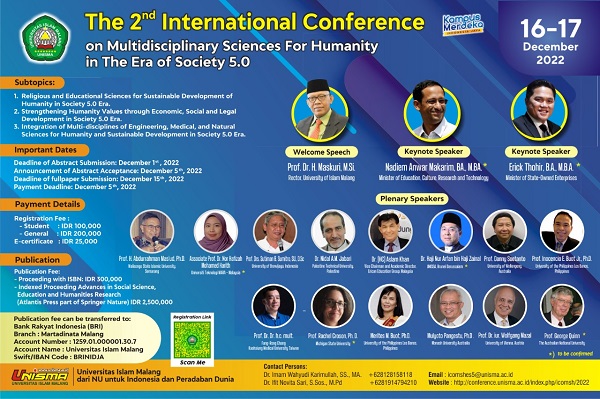
-
Proceedings of The 1st ICOMSH Volume 1, 2021
November 29, 2021 – November 30, 2021Introduction
The era of super-smart society (society 5.0) was introduced by the Japanese Government in 2019, which was created as an anticipation of the disruptive turmoil caused by the industrial revolution 4.0, which caused complex and ambiguous uncertainty. Where at that time, Japan was experiencing a challenge of decreasing population which made the population/workers of productive age reduced, hence Japan tried to improve this condition by implementing Society 5.0. However, it is feared that the invasion could erode the values of human character that have been maintained so far.
Society 5.0 is a society that can solve various challenges and social problems. It utilizes various innovations that were born in the era of the industrial revolution 4.0 such as the Internet on Things (internet for everything), Artificial Intelligence, Big Data (large amounts of data), and robots to improve the quality of human life. Society 5.0 can also be interpreted as a concept of a human-centered and technology-based society.
In facing the era of society 5.0, the world of education plays an important role in improving the quality of human resources. In addition to education, several elements and stakeholders such as the Government, Community Organizations, and the entire society also welcomed the Society 5.0 era.
There are five elements in Society 5.0: emotional elements, intellectual elements, physical elements, social elements, and spiritual elements. The five elements are related to each other in a balance. With the concept of Society 5.0, it is expected to minimize the negative impact of robotic and artificial intelligence technology so that it does not dominate human life without adequate control, but humans are the actors who control and control robotic and artificial intelligence technology. Thus, Society 5.0 is a foresight in organizing an ideal social life. It is as a response to the industrial revolution 4.0 which is feared to degrade human roles due to dependence on advances in robotic technology and artificial intelligence. With Society 5.0, it is hoped that there will be a balance of life between technology and more human quality of human life.
The Conference aims to achieve the following objectives:
- produce theories in Islamic studies, education, economics, law, engineering, medical, and natural sciences through investigations of contemporary issues in the disruptive era.
- produce innovation of new models and methods in Islamic studies, education, economics, law, engineering, medical and natural sciences, which are in harmony with humanity, religiosity and spirituality in an Islamic perspective.
- build scientific networks between scholars and universities throughout Indonesia and the world in collaboration to disseminate and develop a sustainable agenda of "Islamic studies, education, economics, law, engineering, medical and natural sciences"
- encouraging scholars to answer existing problems related to the humanitarian crisis in the current context through world scientific gatherings.
Keynote Speakers:
- Minister of Education, Culture, Research and Technology: H.E Mr. Nadiem Anwar Makarim, BA., M.BA.
- Minister of State-Owned Enterprises: H.E Mr. Erick Thohir, B.A., M.B.A.
Organizer
University of Islam Malang collaborates with the Forum of Indonesian Rectors (FRI), and the Forum of NU Higher Education (FRPTNU).
Host : UNISMA, FRI, and FRPTNU
Co-Host : Universities that are willing to send parallel session presenters at least ten papers
International Conference on Mathematics Education and Technology (ICOMET)
International Conference on Mathematics Education and Technology (ICOMET)
-
The 2nd International Conference on Mathematics Education and Technology (ICOMET)
November 7, 2023 – November 8, 2023.png)
Steering Committee : Dr. Sunismi, M.Pd;
Alifiani, S.Pd., M.Pd;
Dr. Surya Sari Faradiba, M.Pd
Reviewer : Prof. Dr. Drs. Surahmat, M.Si;
Dr. Anies Fuady, M.Pd.
Dr. Yayan Eryk Setiawan, M.Pd
Drs. Zainal Abidin, M.Pd., Ph.D
Editor : Abdul Halim Fathani, M.Pd.
Siti Nurul Hasanah, S.Si., M.Sc,
Gusti Firda Khairunnisa’, M.Pd
Layout & Design : Ahmad Sufyan Zauri, M.Pd
-
THE 1st INTERNATIONAL CONFERENCE ON MATHEMATIC EDUCATION AND TECHNOLOGY (ICOMET) 2022
December 24, 2022 – December 25, 2022
Malang International Conference on Herbs and Toxicants 2023
Malang International Conference on Herbs and Toxicants 2023
Konferensi Nasional Pengabdian Masyarakat (KOPEMAS) #5 & International Community Service 2024
Konferensi Nasional Pengabdian Masyarakat (KOPEMAS) #5 & International Community Service 2024
-
Konferensi Nasional Pengabdian Masyarakat (KOPEMAS) #5 & International Community Service 2024
November 29, 2024 – November 30, 2024 -
Konferensi Nasional Pengabdian Masyarakat (KOPEMAS) #4 & International Community Service 2023
November 29, 2023 – November 30, 2023
-
Konferensi Nasional Pengabdian Masyarakat (KOPEMAS) 2022
December 21, 2022 – December 22, 2022
A. LATAR BELAKANG
Pada masa pemulihan pasca Pandemi Covid-19, Universitas Islam Malang turut berkontribusi dalam percepatan pemulihan pasca Pandemi Covid-19 di Indonesia melalui kegiatan beberapa kegiatan, termasuk Kandidat Sarjana Mengabdi Tematik (KSM-T) untuk mewujudkan masyarakat tangguh yang pulih lebih cepat, bangkit lebih kuat. KSM-T di lingkungan UNISMA merupakan kegiatan intrakurikuler yang dilaksanakan sebagai kegiatan pengabdian kepada masyarakat guna memberikan pengalaman langsung kepada mahasiswa untuk belajar mengindentifikasi potensi wilayah, merencanakan program pengembangan, dan bekerja sama dengan masyarakat untuk melaksanakan rencana program pengembangan yang telah disusun berdasarkan kondisi obyektif masyarakat.
Beragam jenis pengabdian kepada masyarakat (PkM) yang dikembangkan sebagai wujud implementasi program Merdeka Belajar-Kampus Merdeka (MBKM) yang berhubungan langsung dengan kesempatan dan tantangan berkontribusi dalam dunia di luar kampus. Perguruan tinggi berpeluang besar dalam partisipasi aktif, bersama masyarakat, media, dunia, bisnis, dan pemerintah untuk mewujudkan Indonesia yang sejahtera dan berorientasi masa depan (berkelanjutan).
Selanjutnya, untuk menyebarluaskan hasil pelaksanaan Pengabdian pada Masyarakat dan lebih mendorong tumbuh berkembangnya budaya mengabdi pada kalangan dosen baik di lingkungan UNISMA ataupun di luar UNISMA maka Lembaga Penelitian dan Pengabdian pada Masyarakat (LPPM-UNISMA) akan melaksanakan Konferensi Nasional Pengabdian Masyarakat (KOPEMAS) dengan tema “Bersama Masyarakat Mewujudkan Kampung Sejahtera Mandiri yang Berkelanjutan”. Kegiatan seminar nasional pengabdian kepada masyarakat ini juga akan dilakukan dengan bekerjasama dengan beberapa institusi dalam negeri maupun institusi di luar negeri (Malaysia) yang disebut dengan kegiatan “International Community Services”. Kegiatan ini harus dilakukan dengan perencanaan dan pengendalian yang baik agar memiliki hasil yang bermanfaat bagi peserta konferensi nasional ini. Dimana Hasil dari Konferensi nasional pengabdian kepada masyarakat yang nantinya dihasilkan oleh dosen-dosen diharapkan bisa berkontribusi dalam meningkatkan kemajuan, kemandirian, dan daya saing daerah maupun nasional. Kegiatan KOPEMAS 3 ini akan dilaksanakan secara luring dan daring (Hybrid).
B. TARGET
Target yang akan dicapai dalam kegiatan konferensi nasional ini adalah:
1. Penyebarluasan ide, gagasan, dan pengalaman hasil pelaksanaan Pengabdian Pada Masyarakat,
2. Inovasi dan model pemberdayaan masyarakat pada masa setelah pandemi COVID-19 untuk mewujudkan kampung sejahtera yang berkelanjutan,
3. Diseminasi hasil pengabdian kepada masyarakat yang didanai oleh Institusi (HI-MA) maupun yang didanai oleh DRPM DIKTI,
4. Diseminasi hasil Pelaksanaan KSM-T dan MBKM,
5. Menumbuhkan budaya pengabdian pada Masyarakat di lingkungan Perguruan Tinggi,
6. Memperluas kerjasama dengan perguruan tinggi dan pihak-pihak terkait untuk pelaksanaan pengabdian kepada masyarakat di masa yang akan datang, dan
7. Memperluas kerjasama pengabdian pada masyarakat untuk tinkat international dengan adanya “International Community Services” yang akan dilaksanakan dengan universitas di Malaysia.
C. TUJUAN
Tujuan dilaksanakannya kegiatan konferensi ini adalah:
1. Menumbuhkan budaya untuk mengabdi kepada masyarakat yang berintegritas tinggi di lingkungan UNISMA;
2. Meningkatkan angka partisipasi dosen dari semua klaster dosen peneliti dan pengabdi UNISMA untuk melakukan kegiatan pengabdian kepada masyarakat yang memiliki standar kualitas baik.
3. Meningkatkan kemampuan dosen dalam mengabdi agar mampu memberikan inovasi dan gagasan untuk pemulihan masyarakat pada masa setelah pandemic COVID-19.
4. Meningkatkan kolaborasi UNISMA di bidang pengabdian kepada masyarakat pada tingkat nasional,
5. Meningkatkan kuantitas dan kualitas output dan outcome pengabdian kepada masyarakat,
6. akat UNISMA dalam bentuk artikel-artikel yang terbit pada prosiding nasional kradibel dan berkualitas,
7. Meningkatkan outcome hak kekayaan intelektual berupa hak cipta dan paten yang berkualitas dan memiliki potensi kerjasama industri ataupun kerjasama dengan masyarakat luas,
8. Menjalin kerjasama dalam bidang pengabdian pada masyarakat dengan PTS, PTNU, dan PTN, dan
9. Menjalin kerjasama dalam bidang pengabdian pada masyarakat dengan Perguruan Tinggi di Luar Negeri.
D. RUANG LINGKUP
Ruang lingkup dari konferensi ini mencakup:
1. Menumbuh kembangkan budaya pengabdian kepada masyarakat di lingkungan UNISMA,
2. Penyusunan artikel hasil pengabdian kepada masyarakat,
3. Penerbitan artikel hasil pengabdian kepada masyarakat pada prosiding hasil pengabdian pada masyarakat,
4. Kolaborasi pengabdian pada masyarakat dengan institusi dalam dan luar negri.
E. TOPIK ARTIKEL
1. Pemberdayaan Kelembagaan Sosial Masyarakat
2. Pendampingan Sekolah Unggul, Pesantren Produktif
3. Penguatan UMKM, IKM, BUMDes dan Koperasi
4. Pendampingan Pendidikan Karakter dan Budaya
5. Pembangunan Wilayah Berbasis Kearifan Lokal
6. Penggunaan Teknologi Tepat Guna dan Produktifitas
7. Pengembangan Ekonomi Kreatif dan Kewirausahaan
8. Pengembangan Pariwisata
9. Pemberdayaan Sosiopreneur
10. Pendampingan Kesehatan Masyarakat dll.
F. TIME LINE
Berikut adalah tanggal penting dalam pelaksanaan KOPEMAS, sebagai berikut:
No Kegiatan Tanggal
1. Pendaftaran 1 - 25 November 2022
2. Batas Akhir pengumpulan Full paper 25 November 2022, Template dapat diunduh DISINI
3. Proses review Full paper oleh reviewer dan pengiriman LoA kepada peserta 26 November - 3 Desember 2022
4. Batas Akhir Pengumpulan Revisi Fullpaper, Bukti Plagiasi, dan Kuitansi Pembayaran keikutsertaan KOPEMAS 12 Desember 2022
5. Pelaksanaan KOPEMAS 21 Desember 2022
Co-Host:
A. LATAR BELAKANGPada masa pemulihan pasca Pandemi Covid-19, Universitas Islam Malang turut berkontribusi dalam percepatan pemulihan pasca Pandemi Covid-19 di Indonesia melalui kegiatan beberapa kegiatan, termasuk Kandidat Sarjana Mengabdi Tematik (KSM-T) untuk mewujudkan masyarakat tangguh yang pulih lebih cepat, bangkit lebih kuat. KSM-T di lingkungan UNISMA merupakan kegiatan intrakurikuler yang dilaksanakan sebagai kegiatan pengabdian kepada masyarakat guna memberikan pengalaman langsung kepada mahasiswa untuk belajar mengindentifikasi potensi wilayah, merencanakan program pengembangan, dan bekerja sama dengan masyarakat untuk melaksanakan rencana program pengembangan yang telah disusun berdasarkan kondisi obyektif masyarakat.Beragam jenis pengabdian kepada masyarakat (PkM) yang dikembangkan sebagai wujud implementasi program Merdeka Belajar-Kampus Merdeka (MBKM) yang berhubungan langsung dengan kesempatan dan tantangan berkontribusi dalam dunia di luar kampus. Perguruan tinggi berpeluang besar dalam partisipasi aktif, bersama masyarakat, media, dunia, bisnis, dan pemerintah untuk mewujudkan Indonesia yang sejahtera dan berorientasi masa depan (berkelanjutan).Selanjutnya, untuk menyebarluaskan hasil pelaksanaan Pengabdian pada Masyarakat dan lebih mendorong tumbuh berkembangnya budaya mengabdi pada kalangan dosen baik di lingkungan UNISMA ataupun di luar UNISMA maka Lembaga Penelitian dan Pengabdian pada Masyarakat (LPPM-UNISMA) akan melaksanakan Konferensi Nasional Pengabdian Masyarakat (KOPEMAS) dengan tema “Bersama Masyarakat Mewujudkan Kampung Sejahtera Mandiri yang Berkelanjutan”. Kegiatan seminar nasional pengabdian kepada masyarakat ini juga akan dilakukan dengan bekerjasama dengan beberapa institusi dalam negeri maupun institusi di luar negeri (Malaysia) yang disebut dengan kegiatan “International Community Services”. Kegiatan ini harus dilakukan dengan perencanaan dan pengendalian yang baik agar memiliki hasil yang bermanfaat bagi peserta konferensi nasional ini. Dimana Hasil dari Konferensi nasional pengabdian kepada masyarakat yang nantinya dihasilkan oleh dosen-dosen diharapkan bisa berkontribusi dalam meningkatkan kemajuan, kemandirian, dan daya saing daerah maupun nasional. Kegiatan KOPEMAS 3 ini akan dilaksanakan secara luring dan daring (Hybrid).B. TARGETTarget yang akan dicapai dalam kegiatan konferensi nasional ini adalah:1. Penyebarluasan ide, gagasan, dan pengalaman hasil pelaksanaan Pengabdian Pada Masyarakat,2. Inovasi dan model pemberdayaan masyarakat pada masa setelah pandemi COVID-19 untuk mewujudkan kampung sejahtera yang berkelanjutan,3. Diseminasi hasil pengabdian kepada masyarakat yang didanai oleh Institusi (HI-MA) maupun yang didanai oleh DRPM DIKTI,4. Diseminasi hasil Pelaksanaan KSM-T dan MBKM,5. Menumbuhkan budaya pengabdian pada Masyarakat di lingkungan Perguruan Tinggi,6. Memperluas kerjasama dengan perguruan tinggi dan pihak-pihak terkait untuk pelaksanaan pengabdian kepada masyarakat di masa yang akan datang, dan7. Memperluas kerjasama pengabdian pada masyarakat untuk tinkat international dengan adanya “International Community Services” yang akan dilaksanakan dengan universitas di Malaysia.C. TUJUANTujuan dilaksanakannya kegiatan konferensi ini adalah:1. Menumbuhkan budaya untuk mengabdi kepada masyarakat yang berintegritas tinggi di lingkungan UNISMA;2. Meningkatkan angka partisipasi dosen dari semua klaster dosen peneliti dan pengabdi UNISMA untuk melakukan kegiatan pengabdian kepada masyarakat yang memiliki standar kualitas baik.3. Meningkatkan kemampuan dosen dalam mengabdi agar mampu memberikan inovasi dan gagasan untuk pemulihan masyarakat pada masa setelah pandemic COVID-19.4. Meningkatkan kolaborasi UNISMA di bidang pengabdian kepada masyarakat pada tingkat nasional,5. Meningkatkan kuantitas dan kualitas output dan outcome pengabdian kepada masyarakat,6. akat UNISMA dalam bentuk artikel-artikel yang terbit pada prosiding nasional kradibel dan berkualitas,7. Meningkatkan outcome hak kekayaan intelektual berupa hak cipta dan paten yang berkualitas dan memiliki potensi kerjasama industri ataupun kerjasama dengan masyarakat luas,8. Menjalin kerjasama dalam bidang pengabdian pada masyarakat dengan PTS, PTNU, dan PTN, dan9. Menjalin kerjasama dalam bidang pengabdian pada masyarakat dengan Perguruan Tinggi di Luar Negeri.D. RUANG LINGKUPRuang lingkup dari konferensi ini mencakup:1. Menumbuh kembangkan budaya pengabdian kepada masyarakat di lingkungan UNISMA,2. Penyusunan artikel hasil pengabdian kepada masyarakat,3. Penerbitan artikel hasil pengabdian kepada masyarakat pada prosiding hasil pengabdian pada masyarakat,4. Kolaborasi pengabdian pada masyarakat dengan institusi dalam dan luar negri.E. TOPIK ARTIKEL1. Pemberdayaan Kelembagaan Sosial Masyarakat2. Pendampingan Sekolah Unggul, Pesantren Produktif3. Penguatan UMKM, IKM, BUMDes dan Koperasi4. Pendampingan Pendidikan Karakter dan Budaya5. Pembangunan Wilayah Berbasis Kearifan Lokal6. Penggunaan Teknologi Tepat Guna dan Produktifitas7. Pengembangan Ekonomi Kreatif dan Kewirausahaan8. Pengembangan Pariwisata9. Pemberdayaan Sosiopreneur10. Pendampingan Kesehatan Masyarakat dll.F. TIME LINEBerikut adalah tanggal penting dalam pelaksanaan KOPEMAS, sebagai berikut:No Kegiatan Tanggal1. Pendaftaran 1 - 25 November 20222. Batas Akhir pengumpulan Full paper 25 November 20223. Proses review Full paper oleh reviewer dan pengiriman LoA kepada peserta 26 November - 3 Desember 20224. Batas Akhir Pengumpulan Revisi Fullpaper, Bukti Plagiasi, dan Kuitansi Pembayaran keikutsertaan KOPEMAS 12 Desember 20225. Pelaksanaan KOPEMAS 21 Desember 2022 -
Konferensi Nasional Pengabdian Masyarakat (KOPEMAS) 2021
December 11, 2021 – December 12, 2021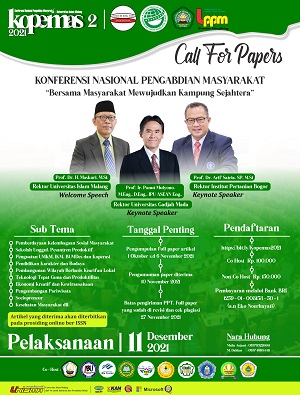
A. Latar belakang
Penyebaran Corona Virus Disease 2019 (COVID-19) yang telah ditetapkan sebagai pandemi oleh World Health Organization (WHO) pada tanggal 11 Maret 2020 semakin meluas. Covid-19 sudah semakin mewabah di Indonesia, dengan tajamnya peningkatan jumlah kasus pasien terinfeksi, pasien dalam pengawasan, dan orang dalam pemantauan setiap hari. Oleh karena itu, Pemerintah telah menetapkan kedaruratan kesehatan masyarakat melalui Keputusan Presiden Nomor 11 Tahun 2020 tentang Penetapan Kedaruratan Kesehatan Masyarakat Corona Virus Disease 2019 (COVID-19), serta Keputusan Presiden Nomor 12 Tahun 2020 tentang Penetapan Bencana Non alam Penyebaran Corona Virus Disease 2019 (COVID-19) sebagai bencana nasional.
Berdasarkan Peraturan Pemerintah Pengganti Undang–Undang Nomor 1 Tahun 2020 tentang Stabilitas Sistem Keuangan untuk Penanganan Pandemi Corona Virus Disease 2019 (COVID-19) dan/atau dalam rangka menghadapi ancaman yang membahayakan perekonomian nasional dan/atau stabilitas keuangan, maka dilakukan langkah-langkah cepat, tepat, fokus, terpadu, dan sinergi antar Kementerian/ Lembaga dan Pemerintah Daerah, untuk melakukan re-focusing kegiatan, realokasi anggaran serta pengadaan barang dan jasa dalam rangka percepatan penanganan Corona Virus Disease 2019 (COVID-19). Kementerian Riset dan Teknologi/Badan Riset dan Inovasi Nasional.
Universitas Islam Malang turut berkontribusi menghadapi Pandemi Covid-19 di Indonesia melalui kegiatan beberapa kegiatan, termasuk melaksanakan forum ilmiah dan menyebarluaskan hasil pelaksanaan pengabdian kepada masyarakat dan lebih mendorong tumbuh berkembangnya budaya mengabdi pada kalangan dosen baik di lingkungan UNISMA ataupun di luar UNISMA maka Lembaga Penelitian dan Pengabdian pada Masyarakat (LPPM-UNISMA) akan melaksanakan Konferensi Pengabdian Pada Masyarakat (KOPEMAS) dengan tema “Bersama Masyarakat Mewujudkan Kampung Sejahtera” Kegiatan ini harus dilakukan dengan perencanaan dan pengendalian yang baik agar memiliki hasil yang bermanfaat bagi peserta konferensi nasional ini. Hasil dari Konferensi nasional pengabdian kepada masyarakat yang nantinya dihasilkan oleh dosen-dosen diharapkan bisa berkontribusi dalam meningkatkan kemajuan, kemandirian, dan daya saing daerah maupun nasional.
B. Target
Target yang akan dicapai dalam kegiatan konferensi nasional ini adalah:
- Penyebarluasan ide, gagasan, dan pengalaman hasil pelaksanaan Pengabdian Pada Masyarakat.
- Inovasi dan model pemberdayaan masyarakat dalam penanggulangan dampak Covid-19.
- Diseminasi hasil Pengabdian Masyarakat yang didanai oleh Institusi (HI-MA) maupun yang didanai oleh DRPM DIKTI.
- Diseminasi hasil Pelaksanaan KSM Tematik Edisi Covid-19.
- Menumbuhkan budaya pengabdian pada Masyarakat di lingkungan Perguruan Tinggi.
- Memperluas kerjasama dengan perguruan tinggi dan pihak-pihak terkait untuk pelaksanaan Pengabdian pada Masyarakat di masa yang akan datang.
C. Tujuan
Tujuan dilaksanakannya kegiatan Workshop ini adalah:
- Menumbuhkan budaya untuk mengabdi kepada masyarakat yang berintegritas tinggi di lingkungan UNISMA;
- Meningkatkan angka partisipasi dosen dari semua klaster dosen peneliti dan pengabdi UNISMA untuk melakukan kegiatan pengabdian kepada masyarakat yang memiliki standar kualitas baik.
- Meningkatkan kemampuan dosen dalam mengabdi agar mampu memberikan inovasi dan gagasan untuk penanggulangan dampak Covid-19.
- Meningkatkan daya saing UNISMA di bidang pengabdian kepada masyarakat pada tingkat nasional
- Meningkatkan kuantitas dan kualitas output dan outcome pengabdian kepada masyarakat UNISMA dalam bentuk artikel-artikel yang terbit pada prosiding nasional kradibel dan berkualitas,
- Meningkatkan outcome hak kekayaan intelektual berupa hak cipta dan paten yang berkualitas dan memiliki potensi kerjasama industri ataupun kerjasama dengan masyarakat luas.
Menjalin kerjasama dalam bidang pengabdian pada masyarakat dengan PTS, PTNU, dan PTN.
D. Ruang Lingkup
Ruang lingkup dari workshop ini mencakup:
- Menumbuh kembangkan budaya pengabdian pada masyarakat di lingkungan UNISMA.
- Penyusunan article hasil pengabdian pada masyarakat
Penerbitan article hasil Pengabdian pada Masyarakat pada prosiding hasil pengabdian pada masyarakat.
E. Topik Artikel- Pemberdayaan Kelembagaan Sosial Masyarakat
- Sekolah Unggul, Pesantren Produktif
- Penguatan UMKM, IKM, BUMDes dan Koperasi
- Pendidikan Karakter dan Budaya
- Pembangunan Wilayah Berbasis Kearifan Lokal
- Teknologi Tepat Guna dan Produktifitas
- Ekonomi Kreatif dan Kewirausahaan
- Pengembangan Pariwisata
- Sociopreneur
- Kesehatan Masyarakat dll.
Berikut adalah tanggal penting dalam pelaksanaan KOPEMAS, sebagai berikut
No
Kegiatan
Tanggal
1
Pengumpulan full paper artikel
1 Oktober s.d 6 November 2021
2
Pengumuman paper diterima
10 November 2021
3
Batas pengiriman PPT, Full Paper yang sudah direvisi dan cek plagiasi
27 November 2021
4
Pelaksanaan KOPEMAS
11 Desember 2021
Co-Host Konferensi Nasional Pengabdian Masyarakat 2021:
-
Konferensi Nasional Pengabdian Masyarakat (KOPEMAS) 2020
December 7, 2020 – December 8, 2020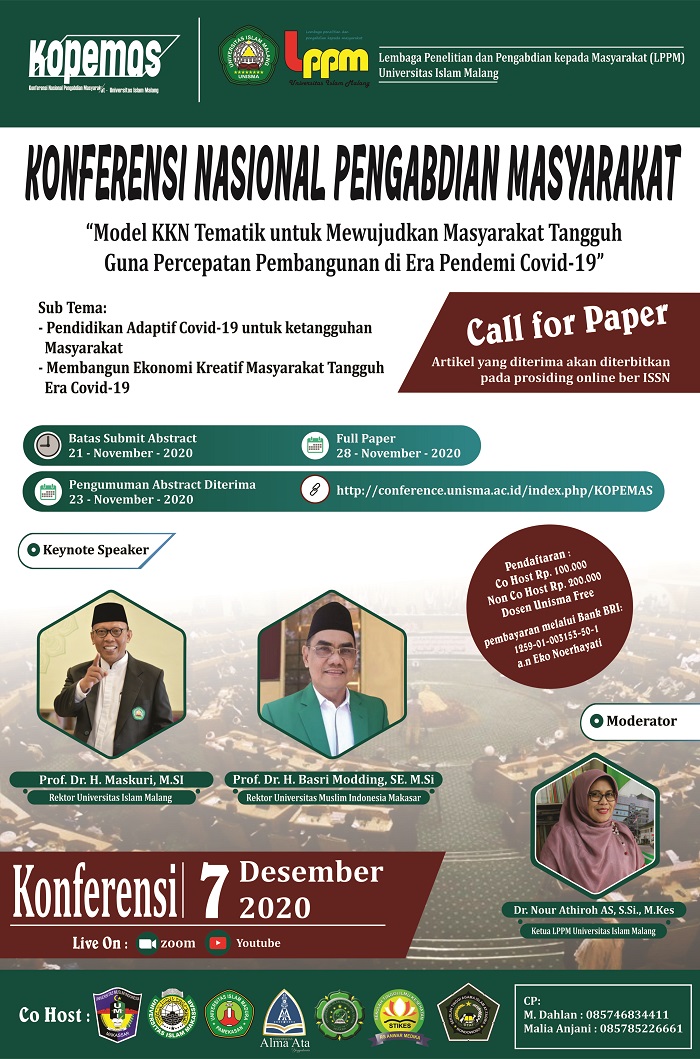
Latar belakang
Penyebaran Corona Virus Disease 2019 (COVID-19) yang telah ditetapkan sebagai pandemi oleh World Health Organization (WHO) pada tanggal 11 Maret 2020 semakin meluas. Covid-19 sudah semakin mewabah di Indonesia, dengan tajamnya peningkatan jumlah kasus pasien terinfeksi, pasien dalam pengawasan, dan orang dalam pemantauan setiap hari. Oleh karena itu, Pemerintah telah menetapkan kedaruratan kesehatan masyarakat melalui Keputusan Presiden Nomor 11 Tahun 2020 tentang Penetapan Kedaruratan Kesehatan Masyarakat Corona Virus Disease 2019 (COVID-19), serta Keputusan Presiden Nomor 12 Tahun 2020 tentang Penetapan Bencana Non alam Penyebaran Corona Virus Disease 2019 (COVID-19) sebagai bencana nasional.
Berdasarkan Peraturan Pemerintah Pengganti Undang–Undang Nomor 1 Tahun 2020 tentang Stabilitas Sistem Keuangan untuk Penanganan Pandemi Corona Virus Disease 2019 (COVID-19) dan/atau Dalam Rangka Menghadapi Ancaman yang Membahayakan Perekonomian Nasional dan/atau Stabilitas Keuangan, maka dilakukan langkah-langkah cepat, tepat, fokus, terpadu, dan sinergi antar Kementerian/ Lembaga dan Pemerintah Daerah, untuk melakukan re-focusing kegiatan, realokasi anggaran serta pengadaan barang dan jasa dalam rangka percepatan penanganan Corona Virus Disease 2019 (COVID-19). Kementerian Riset dan Teknologi/Badan Riset dan Inovasi Nasional.
Universitas Islam Malang turut berkontribusi menghadapi Pandemi Covid-19 di Indonesia melalui kegiatan beberapa kegiatan, termasuk Kuliah Kerja Nyata Pembelajaran Pemberdayaan Masyarakat (KKN-PPM). KKN-PPM edisi Covid-19 di Lingkungan Universitas Islam Malang merupakan kegiatan intrakurikuler yang dilaksanakan di Universitas Islam Malang (UNISMA). Sebagai salah satu perguruan tinggi Islam, UNISMA telah menetapkan KKN-PPM di Lingkungan Universitas Islam Malang sebagai kegiatan intrakurikuler yang wajib ditempuh oleh mahasiswa. KKN-PPM di Lingkungan Universitas Islam Malang sebagai kegiatan pengabdian kepada masyarakat guna memberikan pengalaman langsung kepada mahasiswa untuk belajar mengindentifikasi potensi wilayah, merencanakan program pengembangan dan bekerja sama dengan masyarakat untuk melaksanakan rencana program pengembangan yang telah disusun berdasarkan kondisi obyektif masyarakat.
Selanjutnya, untuk menyebarluaskan hasil pelaksanaan Pengabdian pada Masyarakat dan lebih mendorong tumbuh berkembangnya budaya mengabdi pada kalangan dosen baik di lingkungan UNISMA ataupun di luar UNISMA maka Lembaga Penelitian dan Pengabdian pada Masyarakat (LPPM-UNISMA) akan melaksanakan Konferensi Pengabdian Pada Masyarakat (KOPEMAS) dengan tema “Model KKN Tematik untuk Mewujudkan Masyarakat Tangguh Guna Percepatan Pembangunan di Era Pendemi Covid-19” Kegiatan ini harus dilakukan dengan perencanaan dan pengendalian yang baik agar memiliki hasil yang bermanfaat bagi peserta konferensi nasional ini. Dimana Hasil dari Konferensi nasional pengabdian kepada masyarakat yang nantinya dihasilkan oleh dosen-dosen diharapkan bisa berkontribusi dalam meningkatkan kemajuan, kemandirian, dan daya saing daerah maupun nasional.
A. TARGET
Target yang akan dicapai dalam kegiatan konferensi nasional ini adalah:
- Penyebarluasan ide, gagasan, dan pengalaman hasil pelaksanaan Pengabdian Pada Masyarakat.
- Inovasi dan model pemberdayaan masyarakat dalam penanggulangan dampak Covid-19.
- Diseminasi hasil Pengabdian Masyarakat yang didanai oleh Institusi (HI-MA) maupun yang didanai oleh DRPM DIKTI.
- Diseminasi hasil Pelaksanaan KKN Tematik Edisi Covid-19.
- Menumbuhkan budaya pengabdian pada Masyarakat di lingkungan Perguruan Tinggi.
- Memperluas kerjasama dengan perguruan tinggi dan pihak-pihak terkait untuk pelaksanaan Pengabdian pada Masyarakat di masa yang akan datang.
B. TUJUAN
Tujuan dilaksanakannya kegiatan Workshop ini adalah:
- Menumbuhkan budaya untuk mengabdi kepada masyarakat yang berintegritas tinggi di lingkungan UNISMA;
- Meningkatkan angka partisipasi dosen dari semua klaster dosen peneliti dan pengabdi UNISMA untuk melakukan kegiatan pengabdian kepada masyarakat yang memiliki standar kualitas baik.
- Meningkatkan kemampuan dosen dalam mengabdi agar mampu memberikan inovasi dan gagasan untuk penanggulangan dampak Covid-19.
- Meningkatkan daya saing UNISMA di bidang pengabdian kepada masyarakat pada tingkat nasional
- Meningkatkan kuantitas dan kualitas output dan outcome pengabdian kepada masyarakat UNISMA dalam bentuk artikel-artikel yang terbit pada prosiding nasional kradibel dan berkualitas,
- Meningkatkan outcome hak kekayaan intelektual berupa hak cipta dan paten yang berkualitas dan memiliki potensi kerjasama industri ataupun kerjasama dengan masyarakat luas.
- Menjalin kerjasama dalam bidang pengabdian pada masyarakat dengan PTS, PTNU, dan PTN.
C. RUANG LINGKUP
Ruang lingkup dari workshop ini mencakup:
- Menumbuh kembangkan budaya pengabdian pada masyarakat di lingkungan UNISMA.
- Penyusunan artikel hasil pengabdian pada masyarakat
- Penerbitan artikel hasil Pengabdian pada Masyarakat pada prosiding hasil pengabdian pada masyarakat.
.jpg)
Konferensi Nasional Hukum Islam 2022
Konferensi Nasional Hukum Islam (KNHI) merupakan konferensi yang diselenggarakan oleh Fakultas Agama Islam, khususnya Hukum Islam. KNHI 2022 bertema Hukum Islam Piranti Moderasi Kehidupan Masyarakat yang Damai dan Toleran
-
Konferensi Nasional Hukum Islam 2022
December 15, 2022 – December 16, 2022Konferensi Nasional Hukum Islam (KNHI) adalah konferensi yang dilaksanakan oleh Fakultas Agama Islam Universitas Islam Malang. Khususnya pada bidang hukum Islam. KNHI tahun 2022 bertema "Formulasi Hukum Keluaga Islam: Harapan dan Tantangan"
-
Konferensi Nasional Hukum Islam 2021
December 14, 2022 – December 15, 2022Konferensi Nasional Hukum Islam (KNHI) adalah konferensi yang dilaksanakan oelh Fakultas Agama Islam Universitas Islam Malang. Khususnya pada bidang hukum Islam. KNHI tahun 2021 bertema "Hukum Islam: Piranti Moderasi Masyarakat yang Damai dan Toleran"
INTERNATIONAL CONFERENCE ON LANGUAGE, LITERATURE, AND CULTURAL EDUCATION (ICON-LLCE)
The 3rd INTERNATIONAL CONFERENCE ON LANGUAGE, LITERATURE, AND CULTURAL EDUCATION (ICON-LLCE)
Increasing the Role of Indonesian for the Advancement of Scienceand Global Civilization 1-2 September 2023
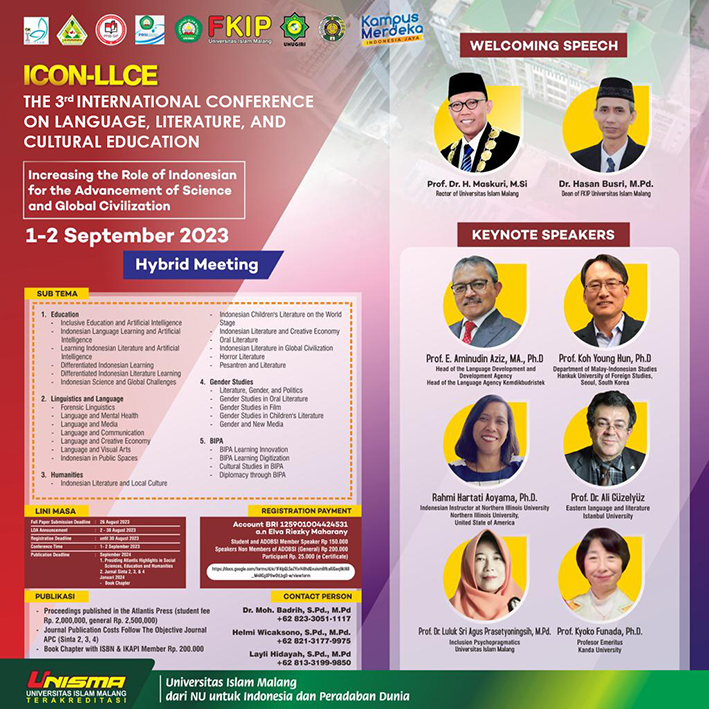
-
The 3RD INTERNATIONAL CONFERENCE ON LANGUAGE, LITERATURE, AND CULTURAL EDUCATION (ICON-LLCE)
September 1, 2023 – September 2, 2023Conference Background
The role of the Indonesian language holds paramount significance, as it serves as an instrumental medium for educating the populace. It retains a steadfast position as a conduit for national communication, a unifying force, and a vital instructional medium for the nation's educational endeavors. In the contemporary epoch of globalization and the advent of Industry 4.0, global communication transcends temporal and spatial boundaries, with language assuming a preeminent role therein. The fortification and consolidation of Indonesian's role in this communicative milieu are imperative. Yet, given the intricate nature of the Indonesian populace, the augmentation and fortification of Indonesian's role necessitates sustained endeavors to ensure the preservation of Indonesian cultural identity within the nation's human resources.
Diligent initiatives to fortify Indonesian as the lingua franca of scientific discourse in this era of globalization demand concerted engagement from various stakeholders, including the Indonesian Language and Literature Education Study Program (PBSI) within the Faculty of Teacher Training and Education (FKIP) at the Islamic University of Malang. The forthcoming Third International Conference on Language, Literature, and Cultural Education (ICON-LLCE) will center its focus on augmenting the role of Indonesian language towards the advancement of scientific inquiry and global civilization.
The digital transformation, which has pervaded Indonesian society, has been markedly accelerated by the global pandemic that has gripped the world since early 2020. Communities worldwide have transitioned their activities to virtual realms, necessitating adaptability to the digital milieu across diverse sectors encompassing commerce, industry, governance, and education. This transition is marked by an increasing reliance on the digital domain, internet infrastructure, and intelligent computing systems, including artificial intelligence, which Bill Gates heralds as commensurate in impact to the advents of mobile telephony and the internet ("The Age of AI has Begun," 2023).
The digital transformation denotes a comprehensive process wherein organizations integrate digital technology across all facets of operation, thus altering the manner in which value is delivered to Indonesian-speaking constituencies. In the Indonesian context, this entails the fundamental adoption of innovative digital technologies to effect cultural and operational shifts that harmonize with evolving demands, habits, and exigencies of the Indonesian-speaking populace. Significantly, this encompasses an expansive online Indonesian dictionary, the integration of information technology and the internet in the pedagogical sphere of teaching Indonesian Language and Literature, and the infusion of artificial intelligence into the educational process for Indonesian as a Second Language (BIPA). Additionally, the repository of books and reference materials in Indonesian will be transitioned to a cloud-based mode, facilitating universal accessibility. In summation, the Internet of Things (IoT) precipitates a discernible transformation in the modes of access and utilization of the Indonesian language, particularly within the domain of scientific inquiry.
From the foregoing elucidation, it is underscored that Indonesian, as the official language of the Indonesian state, assumes a pivotal and strategic role in fortifying the national identity and safeguarding the enduring vitality of the language itself. In light of this, the Indonesian Language and Literature Education Study Program (PBSI) within the Faculty of Teacher Training and Education (FKIP) at the University of Islam Malang will convene the third iteration of the International Conference on Language, Literature, and Cultural Education (ICON-LLCE) in September 2023, under the overarching theme of "Augmenting the Role of Indonesian for the Advancement of Science and Global Civilization. This international conference, which has been ongoing since 2015, succeeds the second edition convened in November 2021. Through this imminent iteration of ICON-LLCE, distinguished scholars and academics representing various global locales will convene to engage in thoughtful deliberations pertaining to initiatives aimed at safeguarding and fortifying the enduring pertinence and robustness of the Indonesian language within the ambit of forthcoming intellectual pursuits and the broader global cultural discourse.
The 3rd INTERNATIONAL CONFERENCE ON LANGUAGE, LITERATURE, AND CULTURAL EDUCATION (ICON-LLCE)
Increasing the Role of Indonesian for the Advancement of Scienceand Global Civilization 1-2 September 2023
⌛ Deadline for Paper Submission26 August 2023
⌚ LoA Announcement2 - 30 August 2023
🏢 Conference Will Be Held on1-2 September 2023
📢 Invited Speakers 🇮🇩 🇺🇸 🇯🇵 🇹🇷 🇰🇷 INTERNATIONAL CONFERENCE ON LANGUAGE, LITERATURE, AND CULTURAL EDUCATION – ICON-LLCE #3 – 2023
The Keynote SpeakerProf. E. Aminudin Azis, Ph. D. 🇮🇩 INDONESIA
Prof. Koh Young Hun, Ph.D .🇰🇷 SOUTH KOREA
Rahmi Hartati Aoyama, Ph. D. 🇺🇸 USA
Prof. Dr. Ali Güzelyüz 🇹🇷 TURKEY
Prof. Dr. Luluk Sri Agus Prasetyoningsih, M.Pd.🇮🇩 INDONESIA
Prof. Kyoko Funada🇯🇵 JAPAN
🖱️ REGISTRATION:https://sl.unisma.ac.id/3ICONLLCE
💰 FeeStudent and ADOBSI Member Speaker: 150KSpeakers Non Members of ADOBSI (General): 200KParticipant : 25k ( e Certificate)
✅ Conference Output- Published In Sinta Indexing Journal- Published In in the Atlantis Press- Published In Book Chapter
🏭VENUEUniversitas Islam Malang (UNISMA)PENGUATAN BAHASA INDONESIA SEBAGAI BAHASA INTERNASIONAL Melalui Deplomasi Bahasa,Sastra Dan Budaya
-
The 2nd INTERNATIONAL CONFERENCE ON LANGUAGE, LITERATURE, AND CULTURAL EDUCATION (ICON-LLCE)
November 26, 2021 – November 27, 20212nd INTERNATIONAL CONFERENCE OF LANGUAGE, LITERATURE, CULTURE ON EDUCATION (ICON-LLCE) mengusung tema "Penguatan Bahasa Indonesia sebagai Bahasa Internasional melalui Diplomasi Bahasa, Sastra, dan Budaya". Pelaksanaan konferensi digelar pada tanggal 26-27 November 2021.
SUBTEMA
- BAHASA
- Problematika Serapan Bahasa Indonesia sebagai Bahasa Internasional
- Linguistika Inklusi
- Pragmatik Bahasa Indonesia
- Analisis Wacana Kritis
- SASTRA & BUDAYA
- Kontribusi Sastra Klasik dan Digital terhadap Perkembangan Bahasa Indonesia sebagai Bahasa Internasional
- Semiotika Tradisional
- Sastra Mutakhir Nusantara
- Budaya & Literasi Digital
- PENDIDIKAN & PEMBELAJARAN
- Kurikulum MBKM dan Upaya Internasionalisasi Bahasa Indonesia
- Model Pembelajaran Inovatif
- Desain Pembelajaran Multikultur
- Asesmen dan Multimedia
- Proyeksi Pembelajaran Bahasa & Sastra Indonesia Masa Depan
- BIPA
- BIPA dan Strategi Internasionalisasi Bahasa Indonesia
- Media Pembelajaran BIPA Terkini
- Problematik Pembelajaran BIPA
- Model Pembelajaran BIPA Terkini
Pembicara Kunci
Nama
Field
Afiliasi
Prof. Nancy K. Florida
Javanese and Islamic Studies, Performance, History, Indonesia, and Literature
University of Michigan, U.S.A
Prof. Dr. Arndt Graf
Malay-Indonesian Language
Goethe-Universität Frankfurt am Main Institut für Ostasiatische, Philologien
Mr. Bobur Samigov
Indonesian Language
Tashkent State University of Oriental Studies, Uzbekistan
Prof. Habib Zarbaliyev
Indonesian Studies Center for Indonesian Studies
Azerbaijan University of Languages, Azerbaijan
Prof. Ben Arps
Indonesian and Javanese Language and Culture
Leiden Universtiy, Belanda
Dr. Luluk Sri Agus Prasetyoningsih, M.Pd.
Psikopragmatik Inklusi
Universitas Islam Malang
Dr. Hasan Busri, M.Pd.
Semiotika Tradisional
Universitas Islam Malang
Dr. Nur Fajar Arief, M.Pd.
Desain Pembelajaran Multikultur
Universitas Islam Malang
Dr. Sri Wahyuni, M.Pd.
Asesmen dan Multimedia
Universitas Islam Malang
Dr. Dyah Werdiningsih, M.Pd.
Model Pembelajaran Inovatif
Universitas Islam Malang
Dr. Akhmad Tabrani, M.Pd
Sastra Mutakhir Nusantara
Universitas Islam Malang
Dr. Muhamad
Rohmadi, M.Hum
Ketua Umum Asosiasi Dosen Pendidikan Bahasa & Sastra Indonesia (ADOBSI)
Universitas Sebelas Maret Surakarta
LINIMASA
Tenggat Pengumpulan Abstrak
:
1 November 2021
Pengumuman Penerimaan Abstrak
:
2 November 2021
Tenggat Registrasi
:
20 November 2021
Waktu Konferensi
:
26-27 November 2021
Tenggat Pengumpulan Makalah Lengkap
:
20 Desember 2021
Tenggat Publikasi
:
4 Maret 2022
PUBLIKASI
- Makalah terpilih terbit di Jurnal terindeks Sinta 2-6 (Biaya pengolahan artikel sesuai jurnal yg dituju, Sinta 2 Rp. 1.500.000,- Sinta 3 dan 4 Rp. 1.000.000,- Sinta 5 dan 6 Rp. 500.000,- dan yang tidak terindex Sinta Rp. 200.000)
- Book Chapter ber ISBN & Anggota IKAPI @150.000
Book Chapter dapat di download di sini!
Buku tersebut merupakan hasil pemikiran para akademisi bidang bahasa Indonesia terkait penguatan bahasa Indonesia sebagai Bahasa Internasional melalui diplomasi Bahasa, Sastra, dan Budaya. Buku ini merupakan hasil publikasi seminar internasional ICON LLCE kedua, diselenggarakan oleh Prodi PBSI FKIP Universitas Islam Malang dan Prodi MPBI Universitas Islam Malang bekerjasama dengan ADOBSI, yang telah terselenggara pada 26-27 November 2021 di Universitas Islam Malang
International Conference on English Language Teaching (ICON-ELT)
The International Conference on English Language Teaching (ICON-ELT) hosted by English Education Department, Universitas Islam Malang has achieved the 5th year conducting international conference with insightful talks, engaging discussions, and valuable networking opportunities. More than thousands of participants have boosted around the continents and globally impacted broader collaboration and individual growth of English Language Teaching (ELT).
The 5th ICON-ELT will be held hybrid on October 9th-10th 2024 under the theme “Navigating Global Trends in ELT: Past, Present, and Future Challenges.” ICON-ELT 2024 invited four celebrated keynote speakers Assoc. Prof. Andrzej Cirocki from University of York, United Kingdom; Dr. Ummi Khaerati Syam from Univ. Muhammadiyah Makasar, Indonesia; Dr. Dzulfikri, M.Pd from Universitas Islam Malang, Indonesia; and a plenary speaker from Regional English Language Office (RELO). The invited speakers are Asst. Prof. Dr. Budi Waluya, FHEA from Walailak University, Thailand and Dr. Aida Binti A. Rahman from Universiti Teknologi Malaysia.
We look forward to seeing you at the ICON-ELT 2024!
With best regards,
Fitri Awaliyatush Sholihah, M.Pd
The Chairperson (2024)
-
THE 5th INTERNATIONAL CONFERENCE ON ENGLISH LANGUAGE TEACHING (ICON-ELT) 2022
October 9, 2024 – October 10, 2024 -
THE 4th INTERNATIONAL CONFERENCE ON ENGLISH LANGUAGE TEACHING (ICON-ELT) 2023
August 30, 2023 – August 31, 2023Conference Background
One of the university's goals is to provide education by improving the quality of human resources and increasing performance through the Tri Dharma of the University, mainly through research. Research has become an essential component in advancing current knowledge. Practitioners and academics can examine how science can be implemented effectively and efficiently through research. The research findings will be disseminated and discussed to demonstrate that they can be trusted and justified for their veracity. Furthermore, when research findings are published in a scientific journal or proceedings, other researchers cite and read them.
Research on teaching and learning English is transforming due to developments pertinent to English learning demands, particularly during and after the Covid-19 pandemic. On the spur of the moment, in-person teaching methods had to be adapted for online delivery. Teachers and professors have undoubtedly transformed English instruction. Organizing education, teaching, and studying English provide new issues for all stakeholders. These modifications may involve upgrading teaching methods suitable and adequate for distance education, the resources, the learning media, the Learning Management System (LMS), etc. This is why arranging scholarly debates between practitioners and advanced students in a particular profession is essential. All practitioners and students throughout the world can benefit from the latest results.
English is now widely used in trade, education, and communication on a global scale. The teaching and learning of English have changed due to current technological breakthroughs. With the emergence of online platforms, digital tools, and resources that can improve the learning experience for both students and teachers, technology has given a new dimension to English instruction.
English teachers now have more options than ever to engage with students at different times and locations and give them experiences for autonomous learning. Technology has been incorporated by professionals in English education to enhance learning, foster digital literacy, and apply efficient language learning techniques.
The English Language Education Study Program, Faculty of Teacher Training and Education of Universitas Islam Malang (Unisma) has organized the International Conference on English Language Teaching (ICON-ELT) since 2020. Historically, the first international conference (The 1st ICON-ELT 2020) has the theme "ELT in the Post-Pandemic Era: From Policies to Practices". The theme was deliberately chosen as a forum for the exchange of ideas between experts in English language teaching on how government policies affect learning models during and after the coronavirus pandemic (Covid-19). This conference which was held on 20-21 November 2020, was successfully carried out with participants from Indonesia and abroad (Singapore, Malaysia, Indonesia, New South Wales, Australia, and Thailand). The invited speakers were Dr. Gumawang Jati from Institute Teknologi Bandung; Prof. Drs. Junaidi Mistar, Ph.D, a lecturer of Unisma, Malang; Dr. Willy Adrian Renandya, NTU, Singapore; and Dr. (H.C) Aslam Khan, MELTA, Malaysia. The outputs of The 1st ICON-ELT 2020 are proceedings with ISSN and several selected articles published in several reputable national journals (ELT Journal, J-REaLL, JEES, IJET, ELTAR-J, and EnJourMe).
In the following year, 2021, we held the second international conference (The 2nd ICON-ELT 2021) with the theme "Challenges in ELT: Issues and Innovation". This activity invited several speakers from abroad, including Prof. Anne Burns, University of New South Wales, Sydney, Australia; Prof. Paul Kei Matsuda, Arizona State University, America, while speakers from within the country included Prof. Dr. Joko Nurkamto, Universitas Sebelas Maret, and Prof. Drs. Junaidi Mistar, Ph.D, Unisma. The conference, which was held on 8-9 December 2021, brought inspiration and became a forum for discussion which was very useful for all parties involved in organizing this international conference. The outputs of The 2nd ICON-ELT 2021 are proceedings with ISSN and several selected articles published in several reputable national journals (JEFL, JEES, JELL, J-REaLL, IJET, ELT Journal, EnJourMe, Abjadia, and JEELL).
In the third year, on 19-20 October 2022, to be exact, we managed to hold an international conference (The 3rd ICON-ELT 2022) in a hybrid way, with the theme "The Future of ELT: Issues and Innovation". The conference activities combined with workshop activities were attended by speakers from Indonesian and abroad, such as Prof. Effendi Kadarisman, Ph.D., Unisma; Prof. Ali Saukah, M.A., Ph.D., Universitas Muhammadiyah Kalimantan Timur; Dr. Willy Ardian Renandya, NTU, Singapore; Prof. Paul Kei Matsuda, Arizona State University, America; Dr. Kara Mcdonald, Editor in Chief of Korea TESOL Journal; Lee Huan Yik, University of Queensland, Australia; Dr. Veronico N. Tarrayo, University of Santo Thomas, Philippines, Emmy Naja, M.Pd., University of Aberdeen, UK. Another innovation that emerged at this third conference was implementing a workshop on publishing scientific papers in which Prof. Kazunori Nozawa is the guest speaker. He is the Editor in Chief of the CALL-EJ journal, which Scopus Q1 has indexed. The workshop also carried the theme "Call Issues for Scholarly Publication: Perspectives from an Editor" and took place successfully and smoothly. Meanwhile, the output of The 3rd ICON-ELT 2022 is proceedings with ISSN and several selected articles published in several accredited national journals (JEFL, JEES, JELL, J-REaLL, IJET, ELT Journal, EnJourMe, Celtic, and Abjadia).
Based on technological developments in learning English, the English Language Education Study Program, Faculty of Teacher Training and Education of Universitas Islam Malang plans to hold the fourth conference (The 4th ICON-ELT 2023) with the theme "The Future of ELT in the Digital Age: Issues and Innovations" on 30-31 August 2023. This conference will explore the challenges and opportunities of teaching English in the digital era. In addition, the sub-themes carry issues related to curriculum, inclusive education, linguistics, etc. This seminar will provide a forum for discussion and collaboration among researchers and English teachers and will allow them to share best practices, experiences, research findings, and innovations in teaching English. The implementation of this international seminar also collaborates with reputable national and international journals so that selected research articles presented at this international conference will be published in national journals accredited by Sinta 1, Sinta 2, and reputable International Journals.
SPONSOR
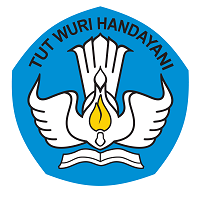
This conference is supported by the Directorate of Research, Technology, and Community Service, Ministry of Education, Culture, Research, and Technology, Indonesia.
-
THE 3rd INTERNATIONAL CONFERENCE ON ENGLISH LANGUAGE TEACHING (ICON-ELT) 2022
November 30, 2022 – December 1, 2022 -
2nd International Conference on English Language Teaching (ICON-ELT) 2021
December 8, 2021 – December 9, 2021THE 2ND INTERNATIONAL CONFERENCE ON ENGLISH LANGUAGE TEACHING (ICON-ELT) 2021 with ISSN number of 2775-0000(online) is an international conference conducted annually in the end of the year; harnessed around ELT. The proceedings publish articles within the fields of Best Practices in ELT Integrated with Technology, ELT Teachers’ and Students’ Perspective about Online Teaching and Learning, ICT-based Assessment in ELT, English Learning Strategies during Online Teaching and Learning, Challenges in Online Teaching English for Young Learners, Technology-enriched Materials Development in ELT, ELT Teachers’ and Students’ Identity in New Normal, Technological Disruption on the Students’ Learning Behavior, Translations and Interpretations, EAP/ESP/CLIL, Language Policy and ELT, Translanguaging in EFL Context and Multilingual Identity in EFL Context.
The committee is delighted that you are interested in joining "The 2nd International Conference on English Language Teaching (ICON-ELT) 2021"
Registration Fee for each presenter:IDR 200,000 (Indonesian Presenter), USD 25 (Overseas)
Registration Fee for each participant:IDR 50,000 (Indonesian Participant), USD 15 (Overseas)
Please transfer to BNI Account 1049218164 (Ika Hidayanti)
If you have any questions regarding this submission, feel free to contact:Diah Retno +62 853-3454-2888 (click this link to chat http://wa.me/6285334542888)Moch. Imron +62 856-4834-5484 (click this link to chat http://wa.me/6285648345484) You can also send us email to iconelt@unisma.ac.id
Best Regards,The 2nd ICON-ELT 2021 Committee -
International Conference on English Language Teaching
December 30, 2020 – December 31, 2020The International Conference on English Language Teaching (ICON-ELT) is the first conference conducted by English Education Department, Faculty of Teacher Training and Education, University of Islam Malang. The conference will be held virtually through Zoom platform on 20 – 21 November 2020 by inviting the keynote speakers from Singapore, Malaysia and Indonesia to deliver their ideas about “ELT in Post-pandemic Era: From Policies to Practices”. This conference is expected to be a forum to address some issues of ELT in the pandemic era and aims at bringing together academics, teachers, researchers and students to exchange ideas and research findings.
Keynote Speakers
- Dr. Aslam Khan
Vice-Chairman of Erican Education Group, Malaysia.
- Prof. Junaidi Mistar, M.Pd., Ph.D.
Universitas Islam Malang, Indonesia.
- Dr. Willy Adrian Renandya
Nanyang Technological University, Singapore.
- Dr. Gumawang Jati
Institut Teknologi Bandung, Indonesia.
Abstract Submission
Abstract Acceptance
Full Paper Submission
14 August - 30 September
1 October – 5 October
10 October - 10 November
International Conference on Islam and Global Civilization (IConIGC)
International Conference on Islam and Global Civilization (IConIGC) is an International Conference of the Faculty of Islamic Sciences, Islamic University of Malang.
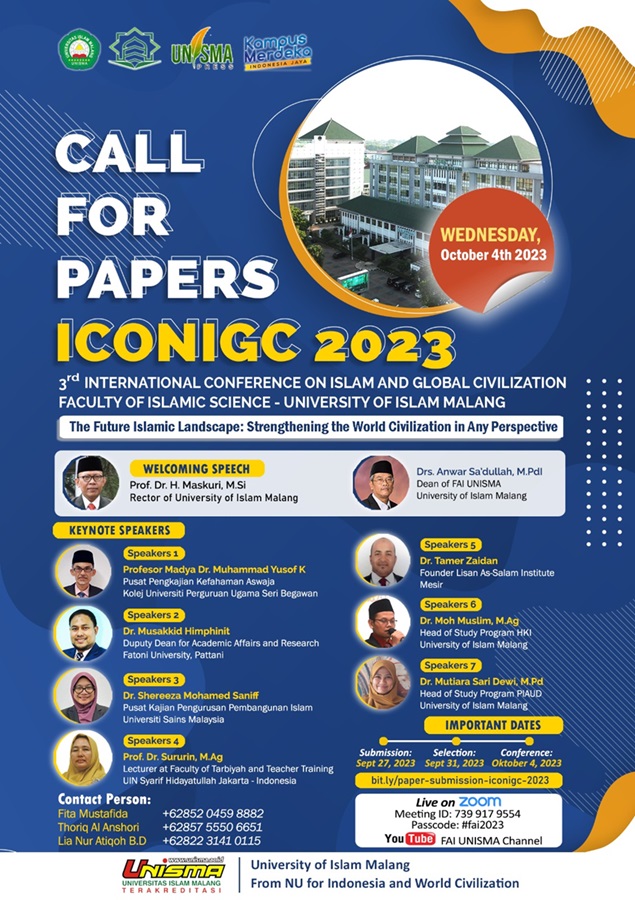
-
International Conference on Islam and Global Civilization 2023
October 4, 2023 – October 5, 2023 -
International Conference on Islam and Global Civilization 2022
September 28, 2022 – September 29, 2022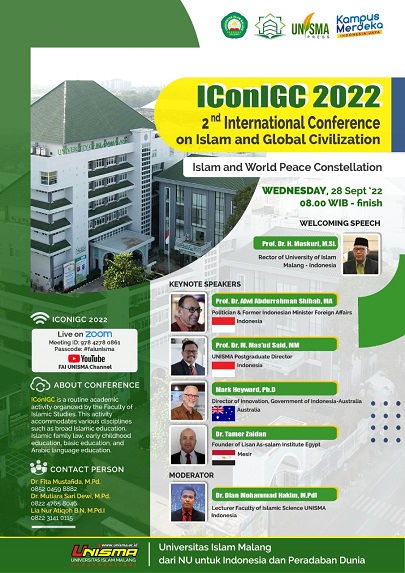
-
International Conference on Islam and Global Civilization
July 14, 2021 – July 15, 2021
Konferensi Nasional Pendidikan Islam
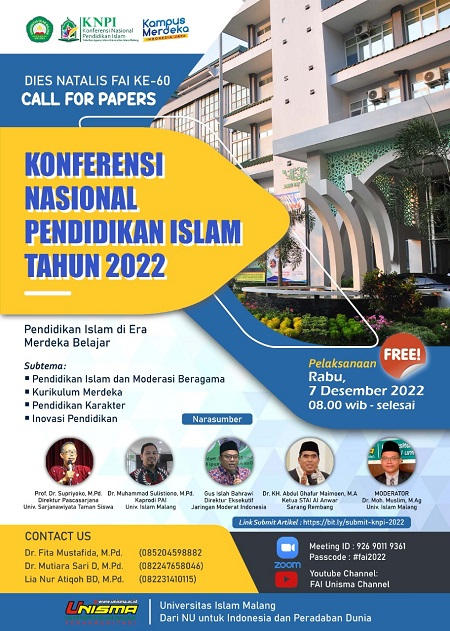
-
Konferensi Nasional Pendidikan Islam 2022
December 7, 2022 – December 8, 2022Konferensi Nasional Pendidikan Islam (KNPI) 2022 merupakan konferensi yang diselenggarakan oleh Fakultas Agama Islam, khususnya bidang ilmu pendidikan Islam. KNPI tahun 2022 bertema Pendidikan Islam di Era Merdeka Belajar.
-
Konferensi Nasional Pendidikan Islam 2021
December 8, 2021 – December 9, 2021Konferensi Nasional Pendidikan Islam (KNPI) 2021 merupakan konferensi yang diselenggarakan oleh Fakultas Agama Islam, khususnya bidang ilmu pendidikan Islam. KNPI tahun 2021 bertema Merdeka Belajar dalam Peta Jalan Pendidikan Islam di Indonesia.
-
Konferensi Nasional Pendidikan Islam
December 15, 2020 – December 16, 2020Konferensi Nasional Pendidikan Islam (KNPI) merupakan konferensi yang diselenggarakan oleh Fakultas Agama Islam, khususnya bidang ilmu pendidikan Islam. KNPI tahun 2020 bertema Pendidikan Islam dalam Konteks Keindonesiaan. Keynote speakers: (1) Prof. Dr. Maskuri, M.Si (Rektor UNISMA); (2) Prof. Dr. Abdul Haris, M.Ag (Rektor UIN MALANG)
Konferensi Nasional Life Science dan Teknologi 2020
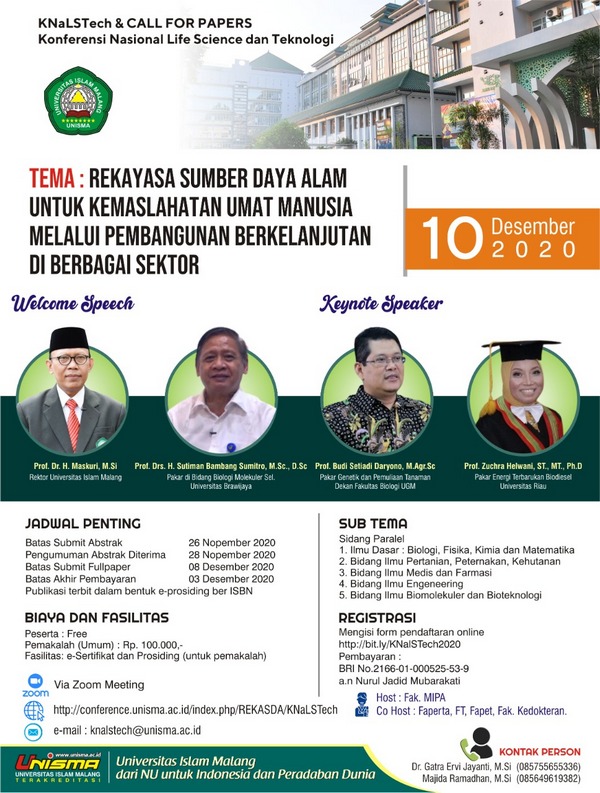
-
Konferensi Nasional Life Science dan Teknologi 2020
December 10, 2020 – December 11, 2020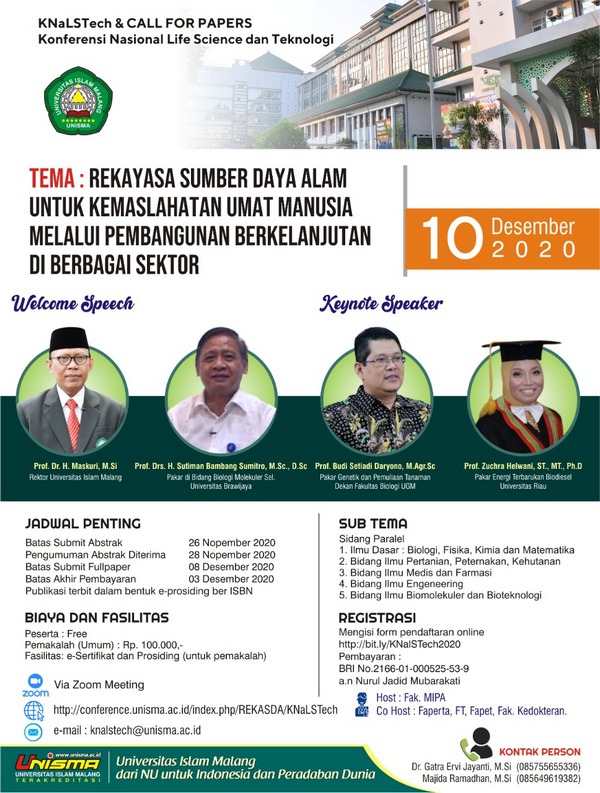
A. PENDAHULUAN
Tujuan Pembangunan Berkelanjutan atau Sustainable Development Goals (SDGs) dideklarasikan pada tanggal 25 September 2015 di Kantor Pusat PBB New York oleh 193 negara sebagai komitmen Agenda Pembangunan Global. SDGs merupakan penyempurnaan dari Agenda Pembangunan Global sebelumnya, karena komitmen pembangunan tidak hanya berfokus pada pembangunan manusia, namun juga pembangunan ekonomi ramah lingkungan serta pembangunan lingkungan hidup. SDGs menempatkan manusia sebagai pelaku sentral dan penikmat hasil pembangunan yang bertujuan untuk kesejahteraan manusia atau human wellbeing.
Pemanfaatan sumber daya alam dan lingkungan hidup yang berorientasi hanya pada sektor tertentu tanpa mempertimbangkan kelestarian dan keberlanjutan telah menimbulkan efek negatif bagi sektor yang lain dan pelaksanaan pembangunan saat ini terutama sektor ketahanan pangan dan ketahanan energi. Pada saat ini, prasyarat utama bagi terlaksananya pembangunan sumber daya alam dan lingkungan hidup yang berkelanjutan diperlukan adanya terciptanya keseimbangan antara pemanfaatan dan kelestarian sumber daya alam dan lingkungan hidup. Oleh karena itu, untuk mengarah pada kegiatan yang mampu mendukung pelaksanaan pembangunan yang berkelanjutan tersebut diperlukan adanya sinergi antara tiap-tiap sektor yang ada baik yang terkait bidang sumber daya alam dan lingkungan hidup maupun yang terkait dengan upaya pengembangan dan pemanfaatan sektor pangan maupun energi. Upaya ini akan berdaya guna apabila ada kolaborasi antara pakar akademisi dan peneliti untuk menyebarluaskan hasil risetnya agar berkontribusi dalam meningkatkan kemajuan, kemandirian, dan daya saing daerah maupun nasional.
Selanjutnya, untuk menyebarluaskan hasil penelitian dan lebih mendorong tumbuh berkembangnya ilmu pengetahuan pada kalangan dosen baik di lingkungan UNISMA ataupun di luar UNISMA maka Fakultas MIPA berkolaborasi dengan Fakultas Pertanian, Fakultas Peternakan, Fakultas Kedokteran-Farmasi dan Fakultas Teknik akan melaksanakan Konferensi Nasional Bertema : “Rekayasa Sumber Daya Alam Untuk Kemaslahatan Umat Manusia Melalui Pembangunan Berkelanjutan Di Berbagai Sektor”. Semoga konferensi nasional ini dapat berkontribusi bagi penyebarluasan pemahaman dan implementasi pembangunan berkelanjutan untuk kemaslahatan bersama.
B. TARGET
Target yang akan dicapai dalam kegiatan konferensi nasional ini adalah:
- Penyebarluasan ide, gagasan, dan pengalaman hasil penelitian.
- Diseminasi hasil penelitian yang didanai olehdikti dan non dikti (Hi-ma atau mandiri).
- Menumbuhkan budaya penelitian di lingkungan Perguruan Tinggi.
- Memperluas kerjasama dengan perguruan tinggi dan pihak-pihak terkait untuk pelaksanaan penelitian di masa yang akan datang.
C. TUJUAN
Tujuan dilaksanakannya kegiatan konferensi nasional ini adalah:
- Menumbuhkan budaya untuk meneliti yang berintegritas tinggi di lingkungan UNISMA;
- Meningkatkan angka partisipasi dosen dari semua klaster dosen peneliti dan pengabdi UNISMA untuk melakukan kegiatan penelitian yang memiliki standar kualitas baik.
- Meningkatkan daya saing UNISMA di bidang penelitian pada tingkat nasional
- Meningkatkan kuantitas dan kualitas output dan outcome penelitian UNISMA dalam bentuk artikel-artikel yang terbit pada prosiding nasional kredibel dan berkualitas,
- Meningkatkan outcome hak kekayaan intelektual berupa hak cipta dan paten yang berkualitas dan memiliki potensi kerjasama industri ataupun kerjasama dengan masyarakat luas.
- Menjalin kerjasama dalam bidang penelitian dengan PTS, PTNU, dan PTN.
D. PELAKSANAAN
Waktu pelaksanaan kegiatan konferensi nasional pada hari Kamis tanggal, 10 Desember 2020 secara daring menggunakan zoom meeting.
E. NARASUMBER DAN PESERTA
Narasumber dalam kegiatan ini adalah
- Prof. Drs. H. Sutiman Bambang Sumitro, M.Sc., D.Sc sebagai pakar di bidang Biologi Molekuler Sel (Dekan Pertama FMIPA Unisma Malang),
- Prof. Budi Setiadi Daryono, M.Agr.Sc sebagai pakar genetik dan pemuliaan tanaman (Dekan Fakultas Biologi, UGM),
- Prof. Zuchra Helwani, ST., MT., Ph.D sebagai pakar energi terbarukan biodiesel (Universitas Riau) dan peserta adalah mahasiswa aktif, dosen, peneliti, alumni dan masyarakat umum.
The 1st University of Islam Malang International Conference of Administrative Science,Legal Studies, Governance, and Law
International Conference of Administrative Science, Legal Studies, Governance, and Law is organized by Law Faculty, University of Islam Malang. Specifically, This conference is scheduled to be held on 22 February 2021 presents the theme of “1St UNIVERSITY OF ISLAM MALANG INTERNATIONAL CONFERENCE OF ADMINISTRATIVE SCIENCE, LEGAL STUDIES, GOVERNANCE, AND LAW (UNISMA ICAS-LGL) 2021” that will be discussed by our prestigious keynote speakers. This conference welcomes any researchers, lecturers, students, practitioners and others across the globe to join, present, share, and discuss their ideas, knowledge, or research findings within the field of Administrative Science, Legal Studies, Governance, and Law.
THE FIRST INTERNATIONAL CONFERENCE ON ANTI-RADICALISM (ICoAR)
CONFERENCE THEME AND SUBTHEMES
The general theme of the conference is “Radicalism and Anti-Radicalism: Past, Present, and Future”. The sub-themes include, but not necessarily limited to, the following:
- Models of religious radicalism: Approach, method, and trends
- Curriculum models of de-radicalism programs
- Religious radicalism and education
- Radicalism and socio-economic problems
- Transnational Islamic movements in Indonesia
- Social media and anti-radicalism programs
- Indonesia Islam: Islam Nusantara
- Civil society and philanthropy
- The rise of Islamic populism around the world
- The roles of women in society toward anti-radicalism
- Local wisdom and religious anti-radicalism
- The roles of Islamic organizations in anti-radicalism movements
OBJECTIVES
The conference is to be carried out in order:
- To share the voices of the national and international academics and observers dealing with the historical development of radicalism and terrorism.
- To share research findings dealing with factors that influence the growth of radicalism and how to overcome it in order to promote and sustain world peace.
- To promote intra-religious and inter-religious brotherhood of mankind.
SPEAKERS AND PARTICIPANTS
The keynote speech in the form of Studium Generale will be delivered by the Head of the National Agency for Combating Terrorism, Komjen Pol Drs. Sunardi Alius, M.H. In addition, there will be invited speakers, paper presenters, and participants. The invited speakers are:
- Prof. Greg Barton (Deakin University, Australia)
- Mrs Ursula McLackland (Secretary General, Universal Peace Federation, Asia)
- Dr. Hj. Adnan bin Hj. Basar (Rais, Kolej Universiti Perguruan Ugama, Brunei Darussalam)
- Prof. Dr. H. Masykuri Abdillah, MA (Indonesia vice presidential expert staff member)
- Prof. Dr. H. Maskuri (Rector of Universitas Islam Malang)
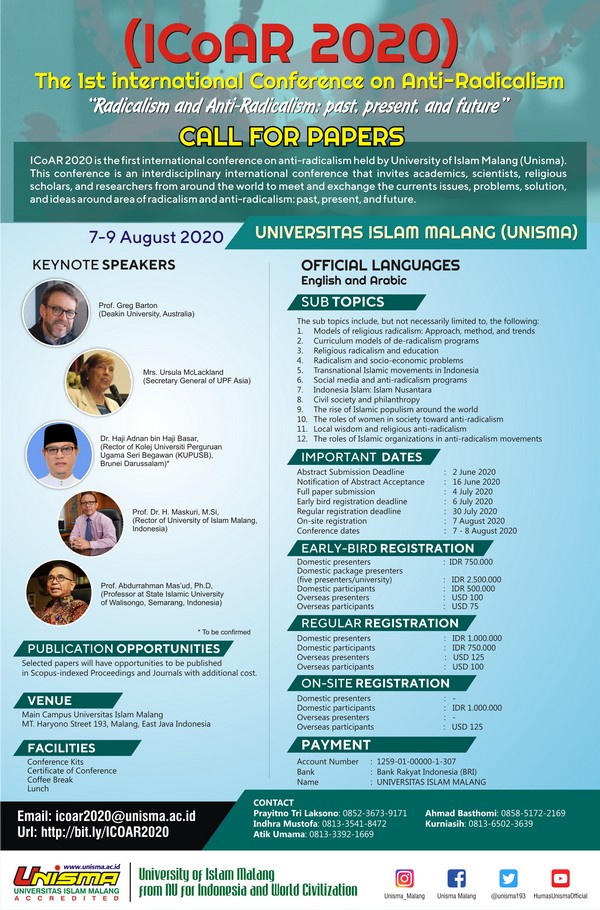
-
ICoAR 2020
August 7, 2020 – August 8, 2020Indonesia is a country with the largest Muslim population in the world, with approximately 87.2% (about 225 million people) of its total population identifying themselves as Muslim. Moreover, in terms of Islamic schools of jurisprudence, the demographic data indicate that 99% of Indonesian muslims follow the Shafii school, while only 1% follow other schools such as Shia and Ahmadiyah.
In Indonesia one of the two largest Muslim organizations is Nahdatul Ulama (NU), founded in 1926 by KH. Hasyim Asya’ari. Although it used to transform itself into a political party, in its congress in Situbondo in 1984 NU declared to return to be a socio-cultural movement. Thus, its focus is on social, religious, and educational activities, operating the country’s majority of Islamic boarding schools. In dealing with other Muslim, people of other religion and the Indonesian government, NU tries to develop the idea of tasamuh (tolerance), tawassuth (moderation), tawazzun (harmony), and al ‘adl (fairness) for the creation of Muslim brotherhood (ukhuwwah Islamiyah), national brotherhood (ukhuwwah wathoniyah) as well as international brotherhood (ukhuwwah basyariyah).
However, the coming of transnational Islamic movements from middle eastern countries leading to the emergence of hardliner groups of Muslims in Indonesia since 1980s has challenged Indonesian national integrity as well as world peace. Since then, discourses of radicalism and terrorism started to appear in Indonesian societal and political contexts.
Radicalism leads potentially to the act of terrorism. In the Indonesian Dictionary (KBBI) the term radicalism is defined as (1) the faith or belief stream that is politically radical; (2) the faith or belief stream that wants a change or renewal in social and politics with violent or drastic means; and (3) an extreme behavior in political stream. A number of characteristics can be identified from those who are the supposed to be radical, including: (1) intolerant (not respecting others’ views and opinions), (2) fanatic (considering others being wrong), (3) exclusive (keeping away from other groups), and (4) revolutionary (tending to use violence to reach the target). Thus, radicalism becomes a serious threat for diversity, peace, and democracy in Indonesia and beyond. Radical people tend to have intolerant behaviors towards others who hold different views and perspectives. In the higher level, they are also very likely to join violent extremist groups.
In response, NU as a Muslim organization of Ahlussunnah wal Jamaah advocates the terms “Islam Wasathiyah” (moderate Islam), a distinctive Islam that has undergone interpretation, interaction, contextualization, and indigenization according to socio-cultural condition of Indonesia. Islam Wasathiyah promotes moderation, compassion, anti-radicalism, inclusiveness, and tolerance, leading to the establishment of communal harmony.
As one of higher education institutions under NU, Universitas Islam Malang (UNISMA) takes the front role to promote the spread of the idea of Islam Wasathiyah (Moderate Islam). Therefore, on 27 November 2019 witnessed by Vice President of the Republic of Indonesia Prof. Dr. K.H. Ma’ruf Amin, UNISMA declared to be a campus of anti-radicalism.
Moreover, we believe that other religions in the world also promote goodness, kindness, tolerance, and harmony that all together will lead to peaceful way of life. Therefore, despite differences in religious beliefs and practices, the followers of any religion should not hinder themselves from being the promoters of mankind brotherhood and they have to take their role in building the world peace through anti-radicalism-oriented programs.
It is in this context then that the coming international conference is to be carried out. The conference is an integral part of the annual program Gerak Lisan Utama (Gebyar Kreatifitas Lintas Ilmu dan Seni Anak Negeri untuk Prestasi Bersama) IV 2020.
SENANDIKA 2020
It is our great pleasure to invite you to the Seminar Nasional Pendidikan dan Ilmu Matematika (SENANDIKA) 2020 with theme “Pemanfaatan Teknologi Virtual Reality (VR) dan AR (Augmented Reality) dalam Pembelajaran Matematika”. This event will be held on December 19, 2020 via Zoom.
The main aim of this conference is to contribute to the development of mathematical sciences, mathematical education, and their applications and to bring together the members of the mathematics community, interdisciplinary researchers, educators, mathematicians, and statisticians from all over the world. The conference will present new results and future challenges, in series of invited and short talks, poster presentations, workshops, and exhibitions. The presentations can be done in English or Indonesian.
SENANDIKA 2020 with the objective of bringing together researchers, whether they are members of the network or not, whose work is related to algebra, geometry, discrete mathematics and mathematics education, as well as their possible applications such as (but not restricted to):
Mathematics Education
- Activities and Programs for Students with Special Needs
- Evaluation and Assessment in Mathematics Education
- Improving the Curriculum
- Popularization of Mathematics
- Problem Solving and Modelling
- Reasoning, Proof and Proving in Mathematics Education
- School Organization and Classroom Practices
- Teacher Preparation and Ongoing in-Service Work
- The Use of Mathematics in The Sciences, Informatics and in The Real World
- Using Technology in Mathematics Education
- Ethnomathematics
Mathematics
- Algebra
- Algebraic Geometry
- Complex Analysis
- Computer Sciences
- Control Theory and Optimization
- Differential Equations
- Differential Geometry
- Discrete Mathematics
- Functional Analysis
- Fuzzy Logic and Its Applications
- Geometry
- Mathematical Logic and Foundations
- Mathematical Physics
- Number Theory
- Numerical Analysis
- Probability Theory and Statistics
- Real Analysis
- Topology
All presented paper’s abstracts will be published in the conference proceeding. Moreover, selected and peer review articles will be published in Jurnal Pendidikan Matematika/JPM (Journal Indexed by Sinta)
-
Seminar Nasional Pendidikan dan Ilmu Matematika (SENANDIKA) 2020
February 1, 2020 – February 2, 2020 -
SENANDIKA 2019
December 14, 2019 – December 15, 2019Tanggal Pelaksanaan : Sabtu, 14 Desember 2019
Waktu Pelakasanaan : 07.00 – Selesai
Tempat Pelaksanaan : Hall Oesman Mansyur Gedung Al-Hanafi lantai 3 Universitas Islam Malang
Pemateri :
1. Prof. Dr. Drs. Surahmat, M.Si.
2. Dr. H. Abdur Rahman As’ari, M.Pd., M.A.
Tanggal Penting :
pengumpulan abstrak terakhir 06 November 2019
Pengumuman penerimaan 08 November 2019
Pengumpulan full paper terakhir 15 November 2019
Registrasi Deadline 29 November 2019
- Artikel yang terpilih akan diterbitkan di Jurnal Pendidikan Matematika (JPM) (terindeks sinta 4)
- Prosiding Online ber-ISBN
Fasilitas
- E-sertifikat
- E-buklet
- Prosiding online , jika dalam bentuk cetak dikenai biaya tambahan
- Seminar kit (Goodie Bag, Bulpoin, Block Note)
- Snack dan makan siang
- ID Card
CP :
Bu Surya Sari Faradiba 085649532920
M. Fajar Musafak 081332038656
Link Penting:
Pendaftaran bisa dilakukan dengan registrasi akun --> login--> klik call for paper.
Template Full Paper
The First International Conference On Teacher Training and Education 2018
The First International Conference on Teacher Training and Education
(ICOTTE) 2018
“Teacher Training and Education in the Era of Industry 4.0”
(Pendidikan Keguruan di Era Revolusi Industri 4.0)
Wednesday and Thursday, 25 – 26April, 2018
-
The First International Conference On Teacher Training and Education 2018
April 25, 2018 – April 26, 2018The First International Conference on Teacher Training and Education
(ICOTTE) 2018
“Teacher Training and Education in the Era of Industry 4.0”
(Pendidikan Keguruan di Era Revolusi Industri 4.0)
Gerak Lisan Utama II
As one of higher education institutions under NU, Universitas Islam Malang (UNISMA) takes the front role to promote the spread of the idea of Islam Nusantara. It is in this context that this international conference is to be carried out. The conference is an integral part of the annual program Gerak Lisan Utama (Gebyar Kreativitas Lintas Ilmu dan Seni Anak Negeri untuk Prestasi Bersama)” II 2018.
-
International Conference on "Islam Nusantara, National Integrity, and World Peace" 2018
March 27, 2018 – March 28, 2018As one of higher education institutions under NU, Universitas Islam Malang (UNISMA) takes the front role to promote the spread of the idea of Islam Nusantara. It is in this context that this international conference is to be carried out. The conference is an integral part of the annual program Gerak Lisan Utama (Gebyar Kreativitas Lintas Ilmu dan Seni Anak Negeri untuk Prestasi Bersama)” II 2018.
As an integral part of Gerak Lisan Utama II, the opening Ceremony and Studium Generale by Presiden Ir. Joko Widodo will be attended by about 10.000 people. Then, around 750 participants and presenters will attend sessions of the keynote speakers, invited speakers, and paper presenters.
The keynote speakers are:
- Coordinating Minister of Politic, Law, and Security Affairs (Gen. Dr. H. Wiranto, SH)
- Indonesian Military Chief (Marsekal Hadi Tjahjanto)
- Presidential Special Delegate for Middle East (Dr. Alwi Sihab)
- Minister of Research, Technology and Higher Education (Prof. Mohammad Nasir)
- Minister of Religious Affairs (H. Lukman Hakim Saifuddin)
- Head of National Board of NU (Prof. Dr. KH. Said Agil Siradj, MA)
The invited speakers are:
- Prof. Ronald A. Lukens-Bull (University of Florida, USA)
- Prof Greg Barton (Deakin University, Australia)
- Moazzam Malik (British Ambassador to Indonesia, ASEAN, and Timor Leste)
- Prof. Dr. Azyumardi Azra (UIN Syarif Hidayatullah, Jakarta)
- Prof. KH. M. Tolhah Hasan (Universitas Islam Malang)
The theme of the conference is “Indonesian Islam, National Integrity, and World Peace”. The subthemes include, but not necessarily limited to, the following
- Islam Nusantara and Pluralism
- Islam Nusantara and Anti-Radicalism
- Islam Nusantara and democracy
- Islam Nusantara and National Integrity
- Islam Nusantara and World Peace
The conference is to be carried out in order:
- To have a better understanding of the concept of Indonesian Islam (Islam Nusantara)
- To hear the voices of the national and international academics and observers on the role of Islam Nusantara in promoting and sustaining national integrity as well as world peace.
- To promote Islamic brotherhood, national brotherhood, and international brotherhood to promote and sustain world peace.
CONTINUING MEDICAL EDUCATION
Kegawatdaruratan Jantung Dalam Praktek Sehari-hari: Diagnosis dan Tatalaksana “Cardiovascular Update for General Practitioner”
-
CONTINUING MEDICAL EDUCATION
2nd International Conference Of Environment Pollutant On Human Health (ICEPHH)
Nano particle use in medicine and its relation to disease pathogenesis and progesssion
-
September 2018
September 26, 2018 – September 28, 2018
GRADUATE Program English Department
1st International Conference on English Language Teaching and Research (ELTAR)
-
English Language Teaching and Research 2018
February 21, 2018 – February 22, 2018

